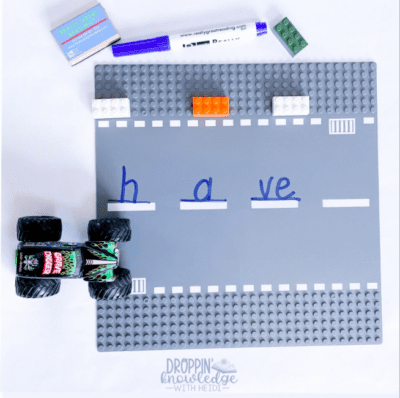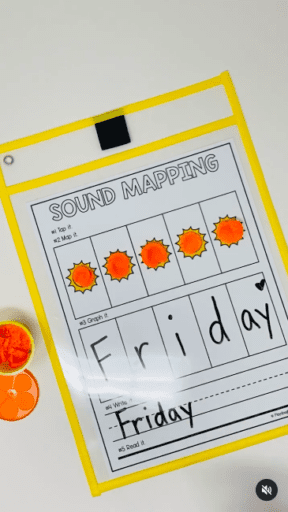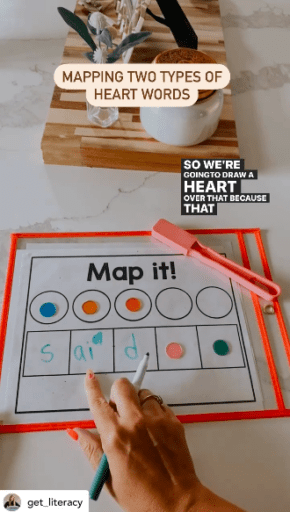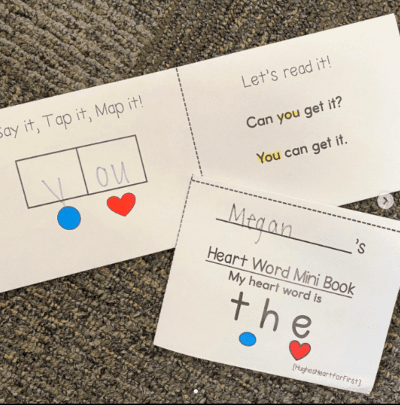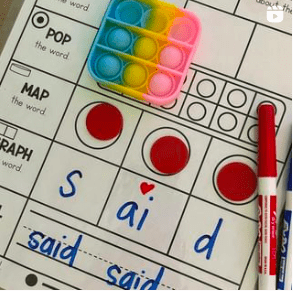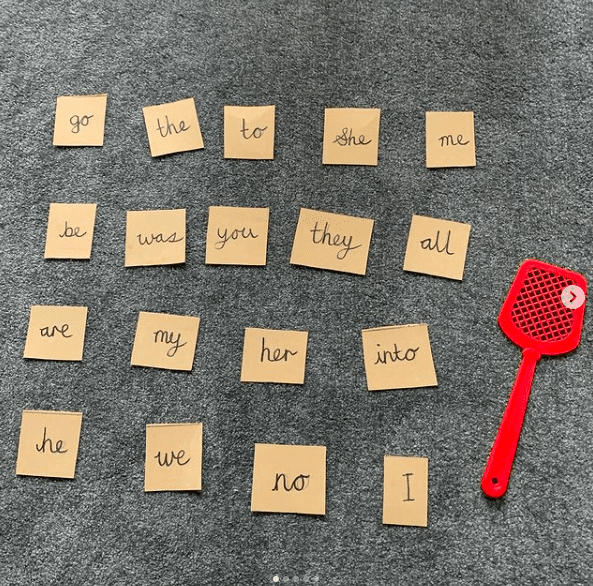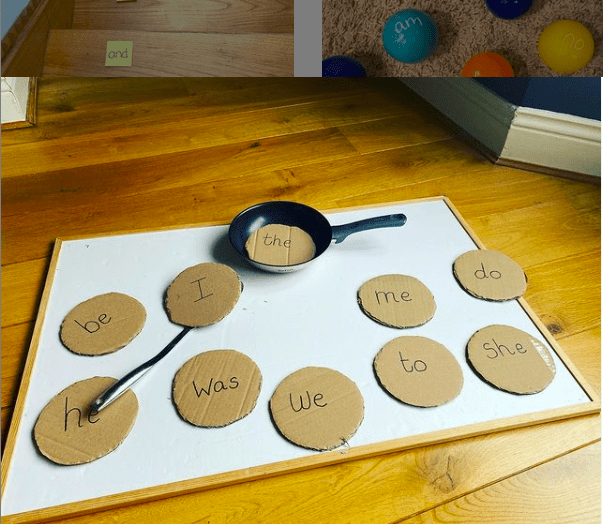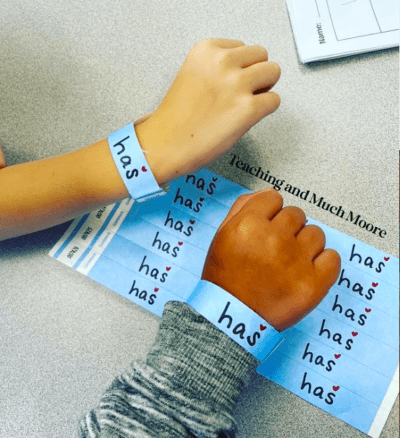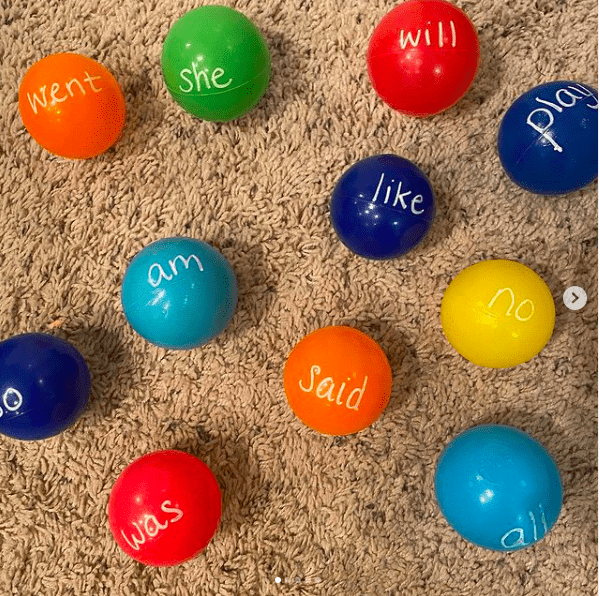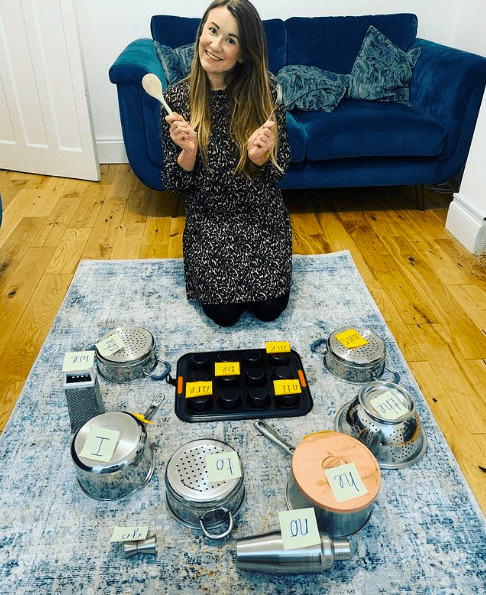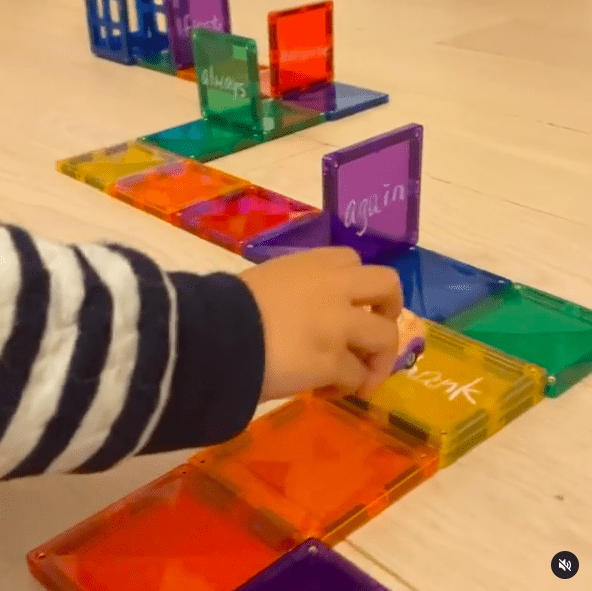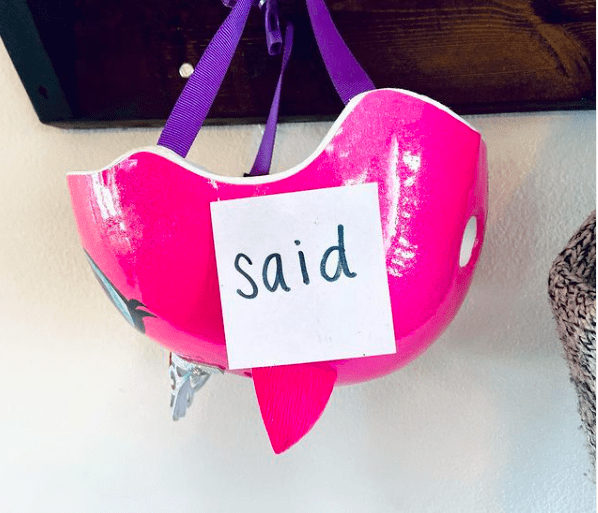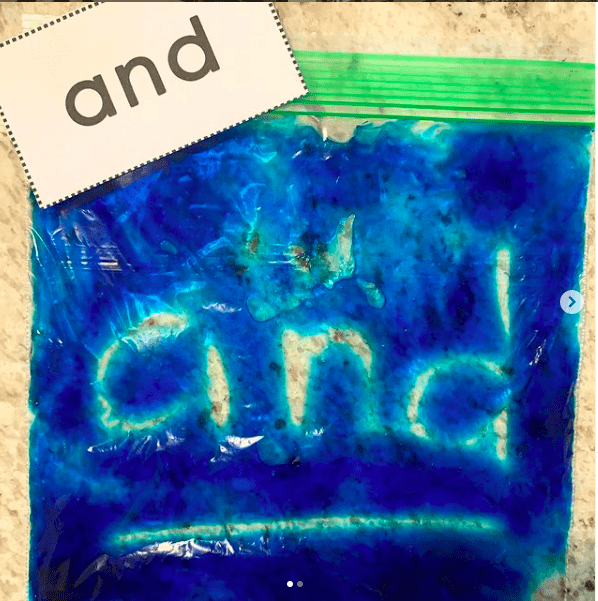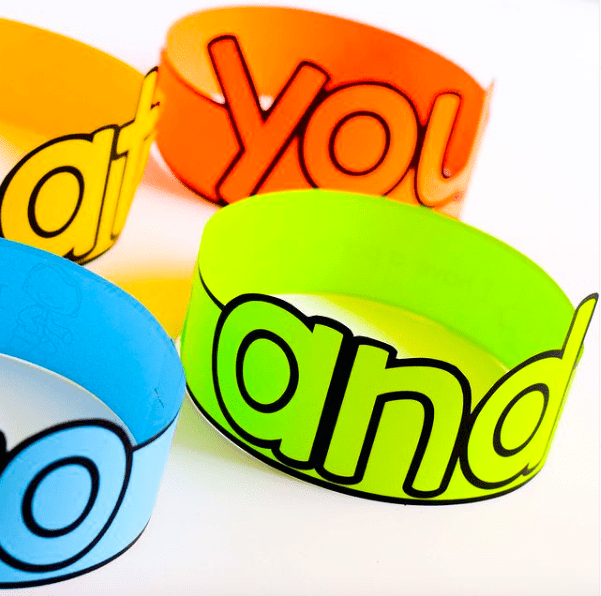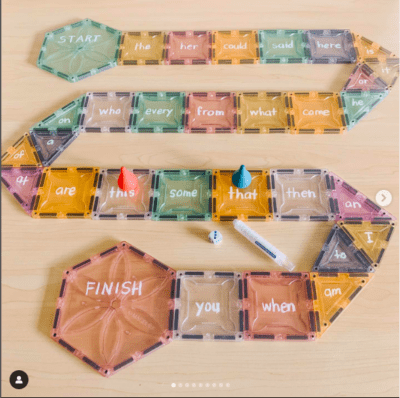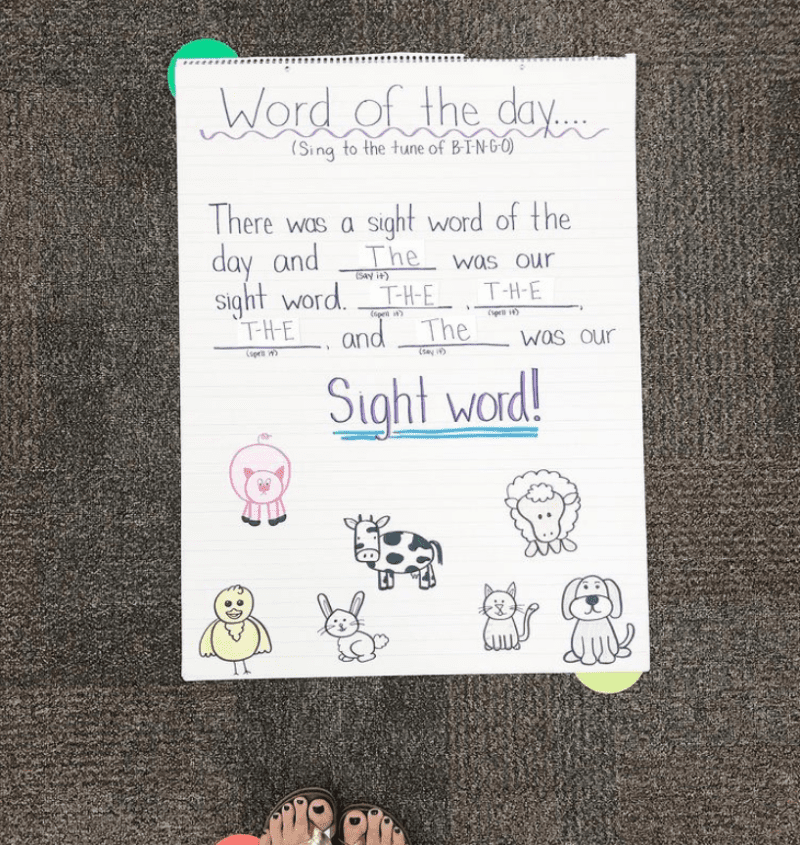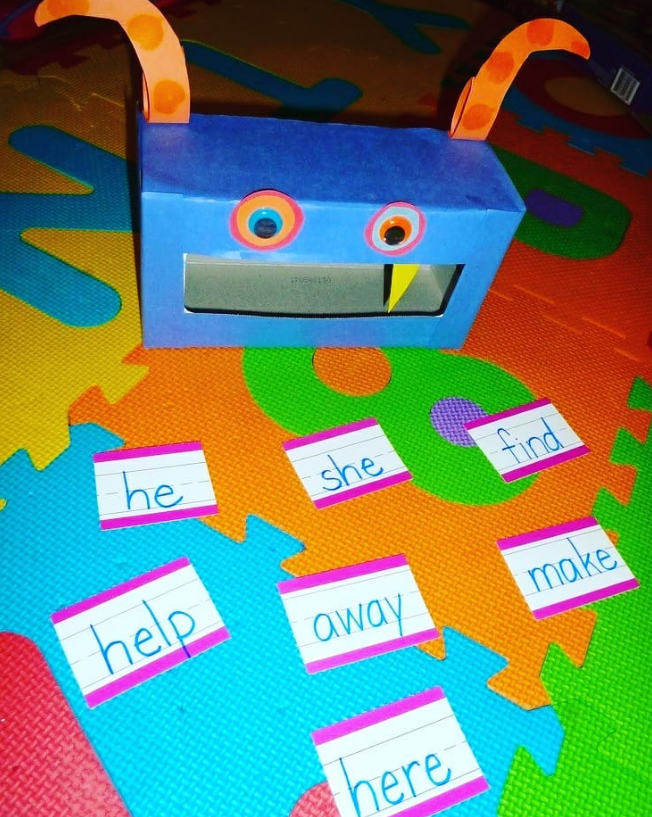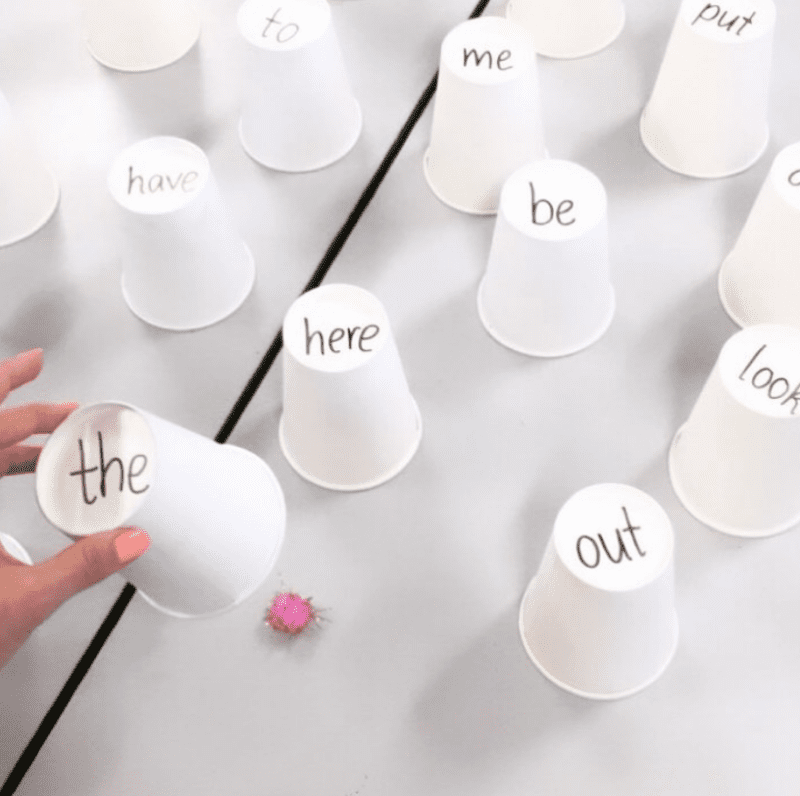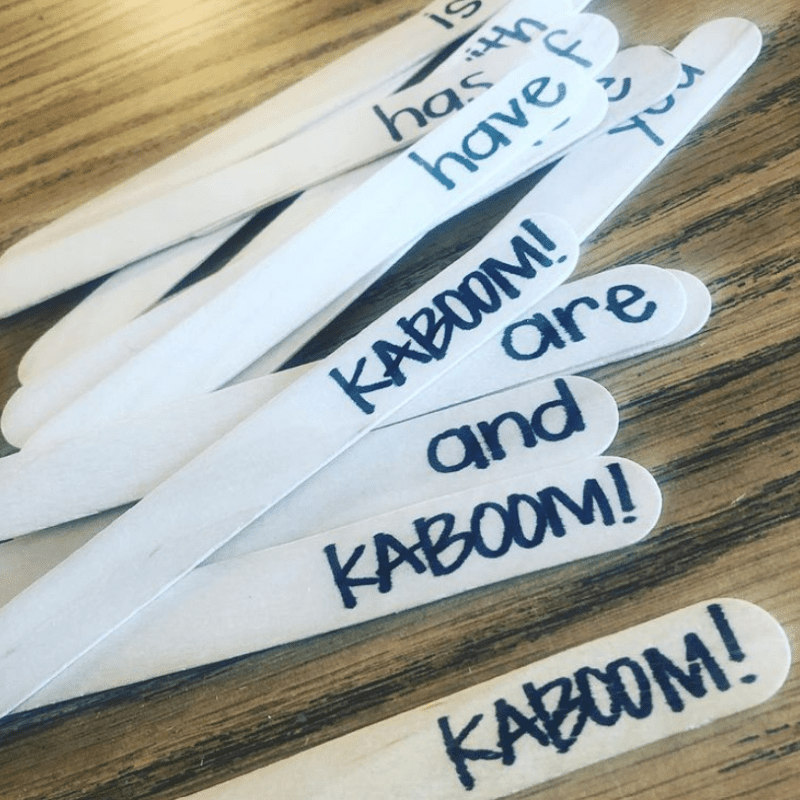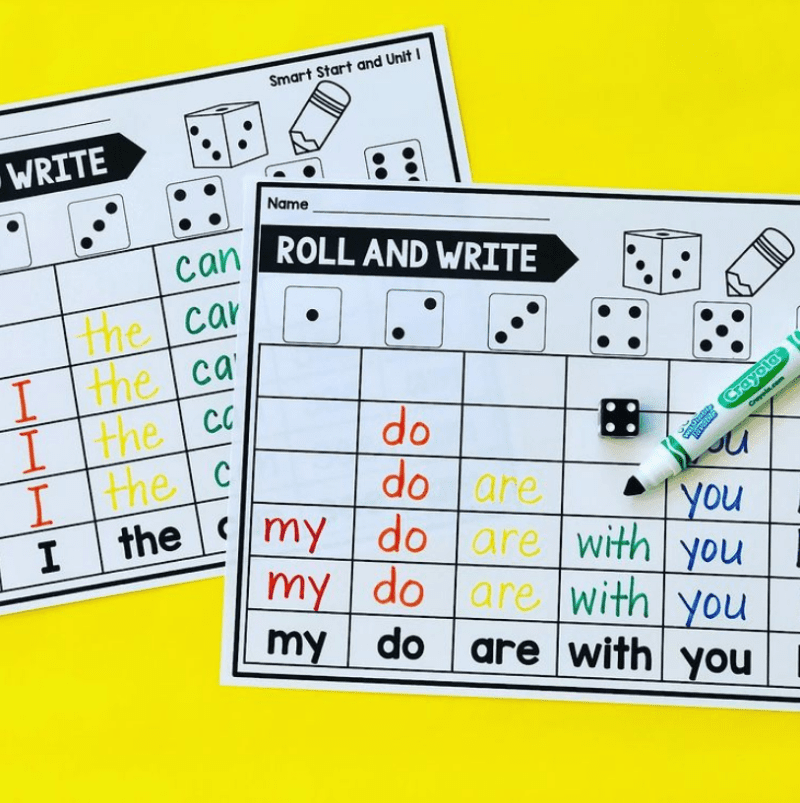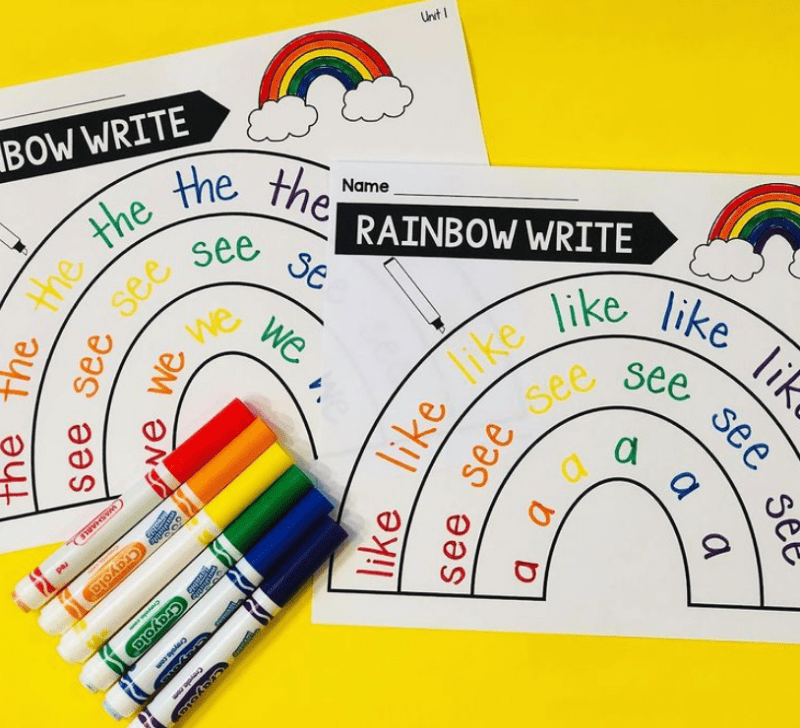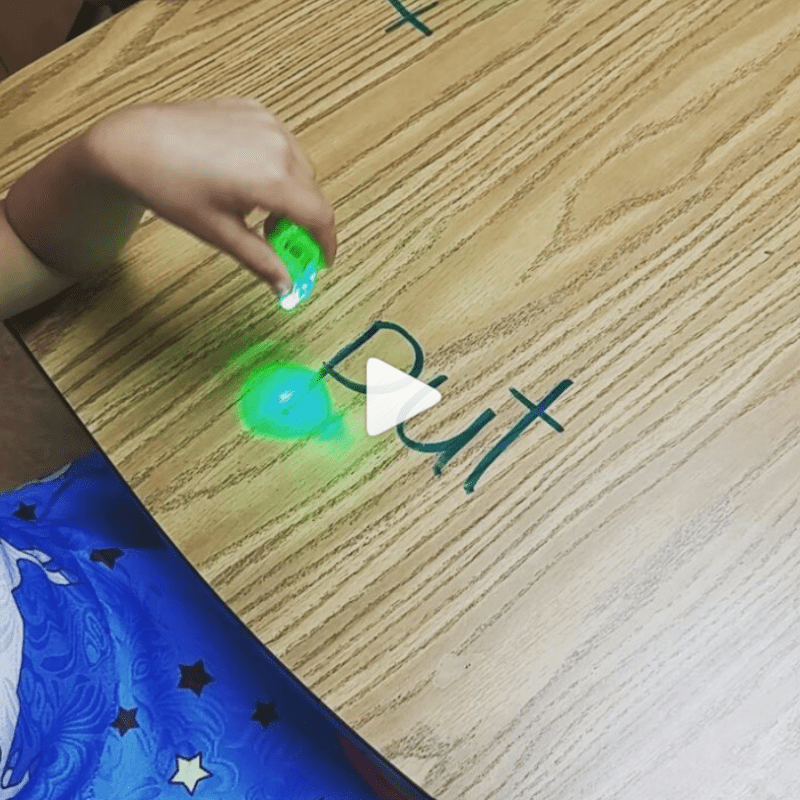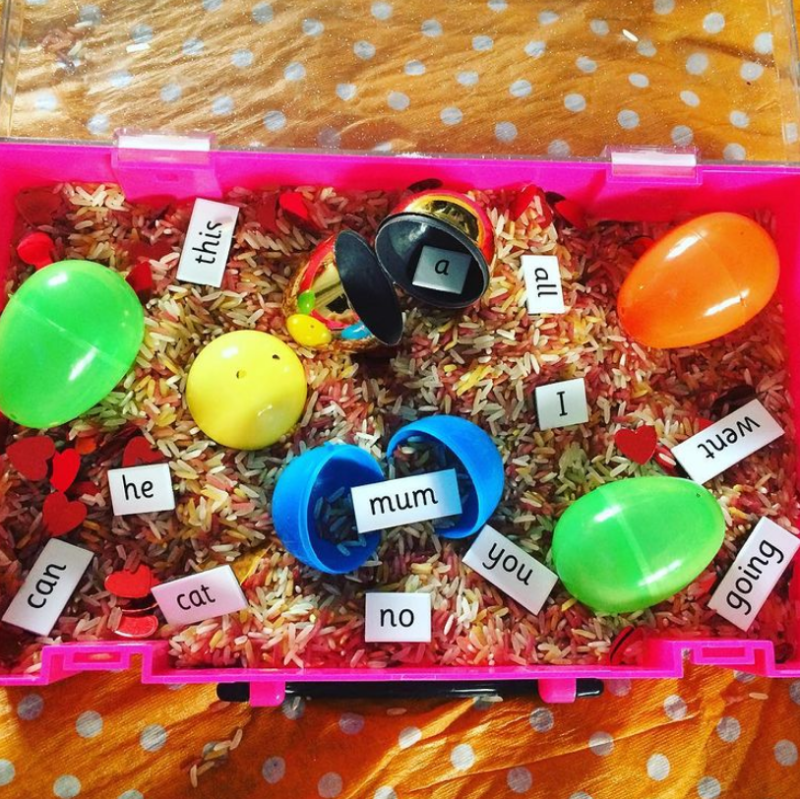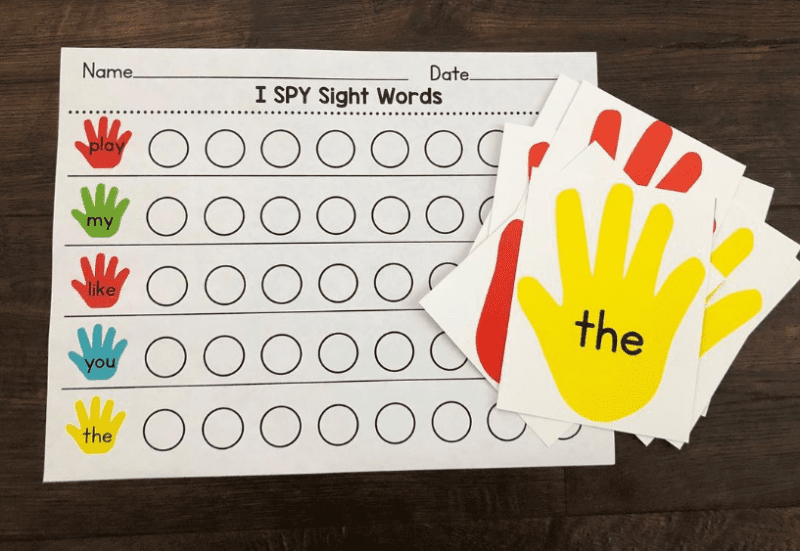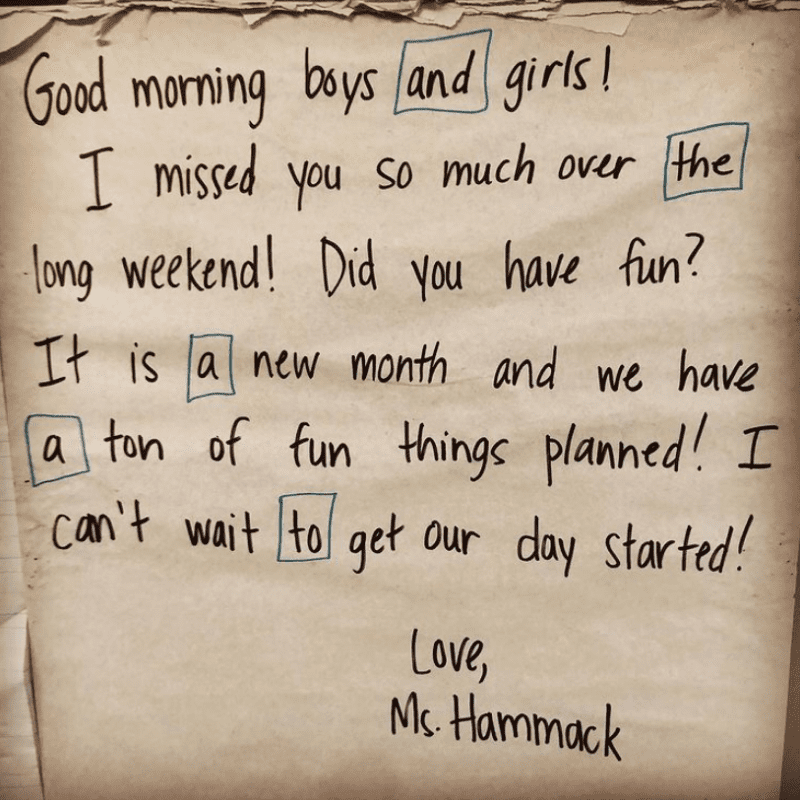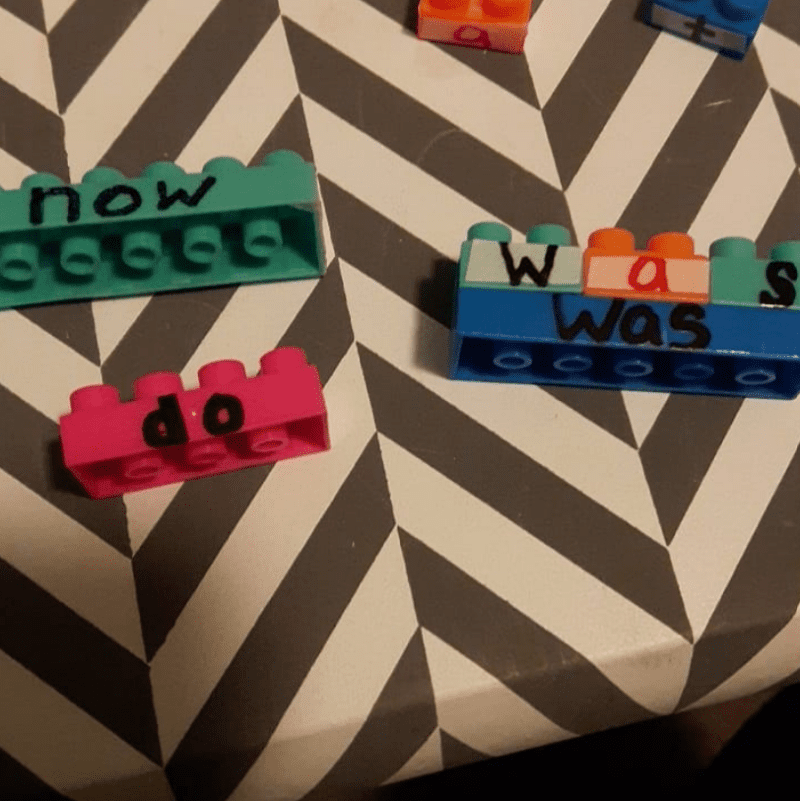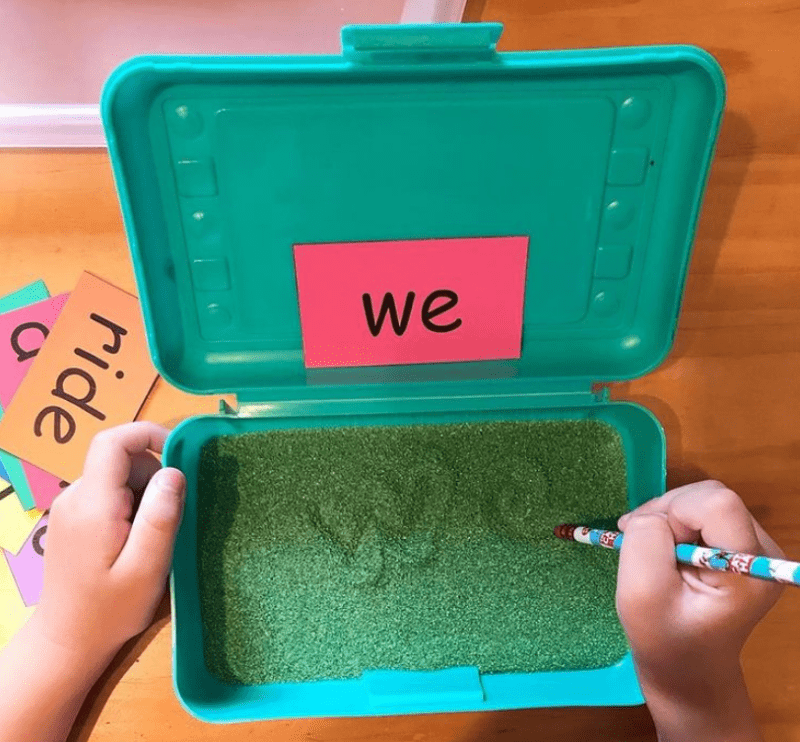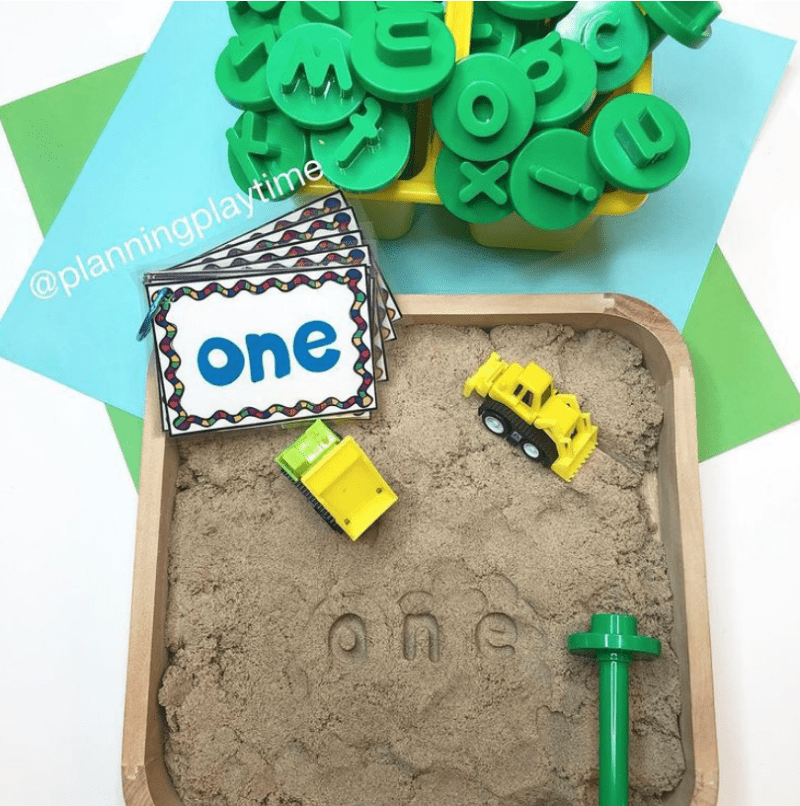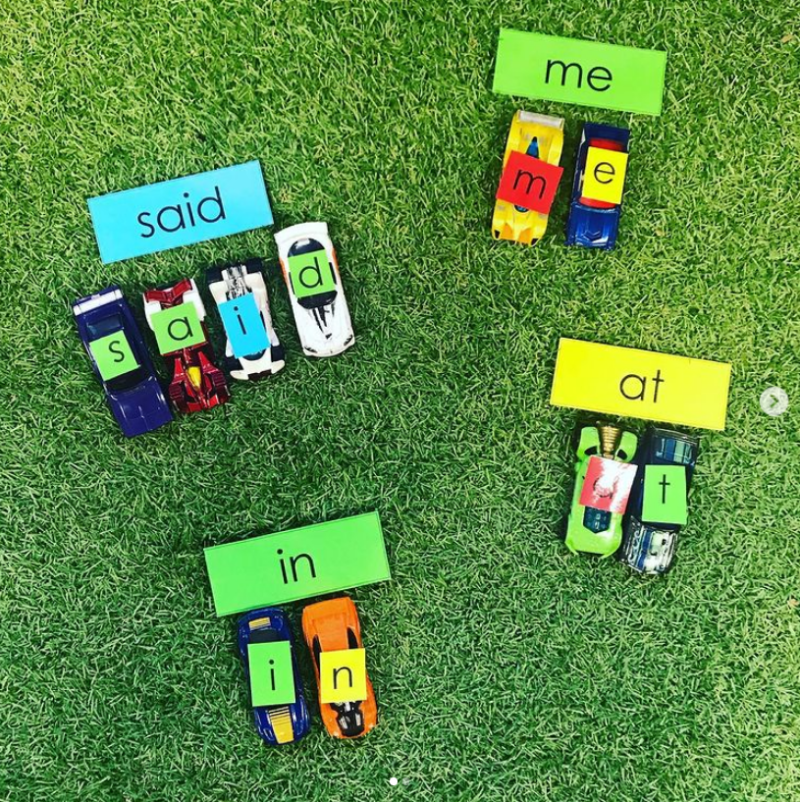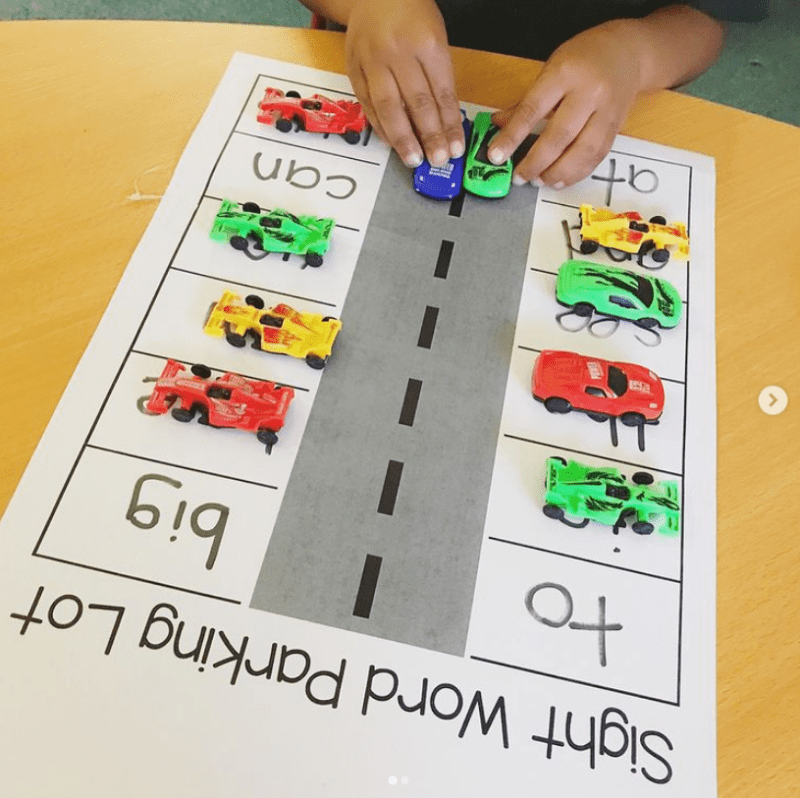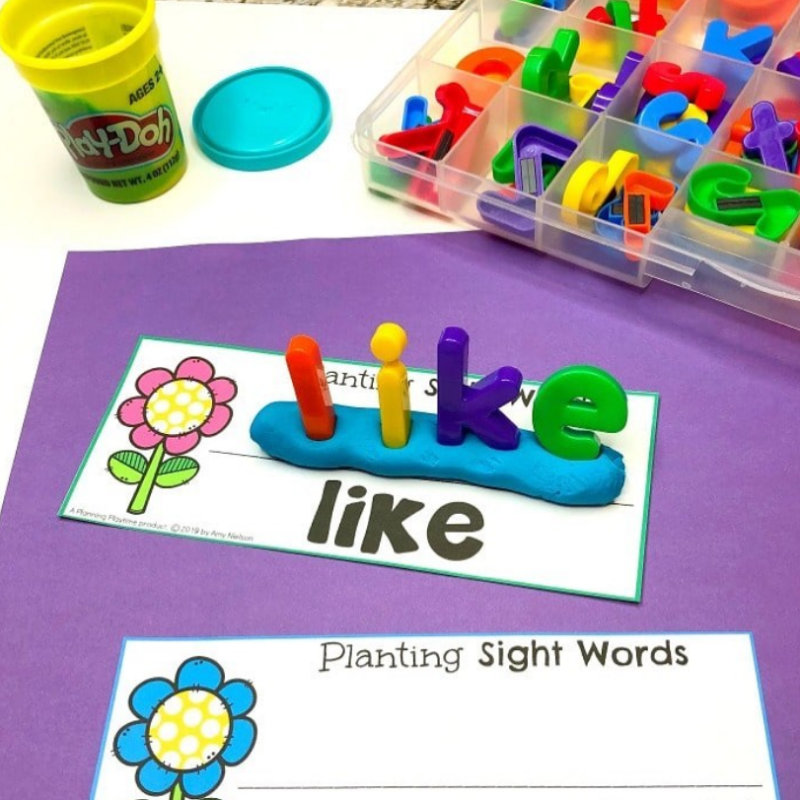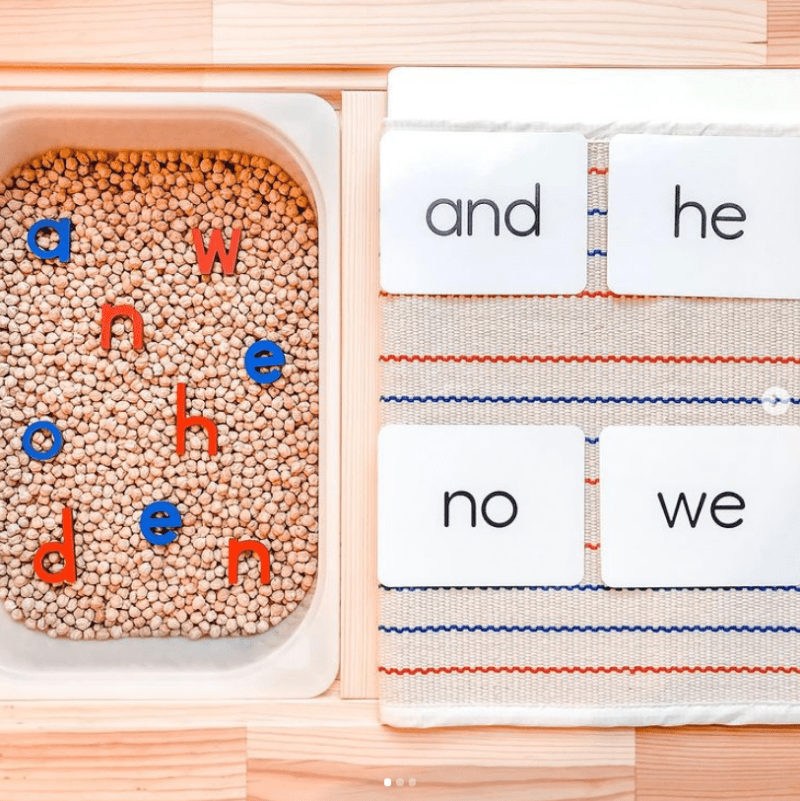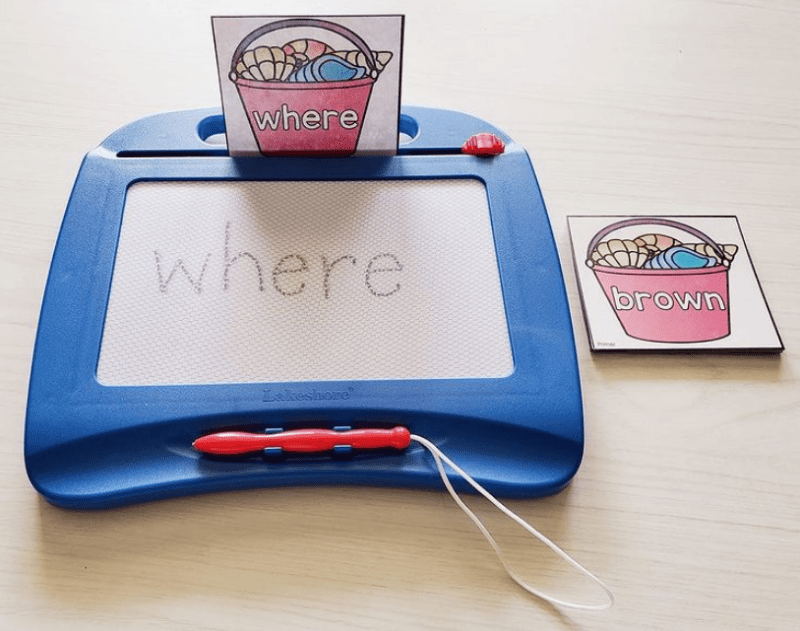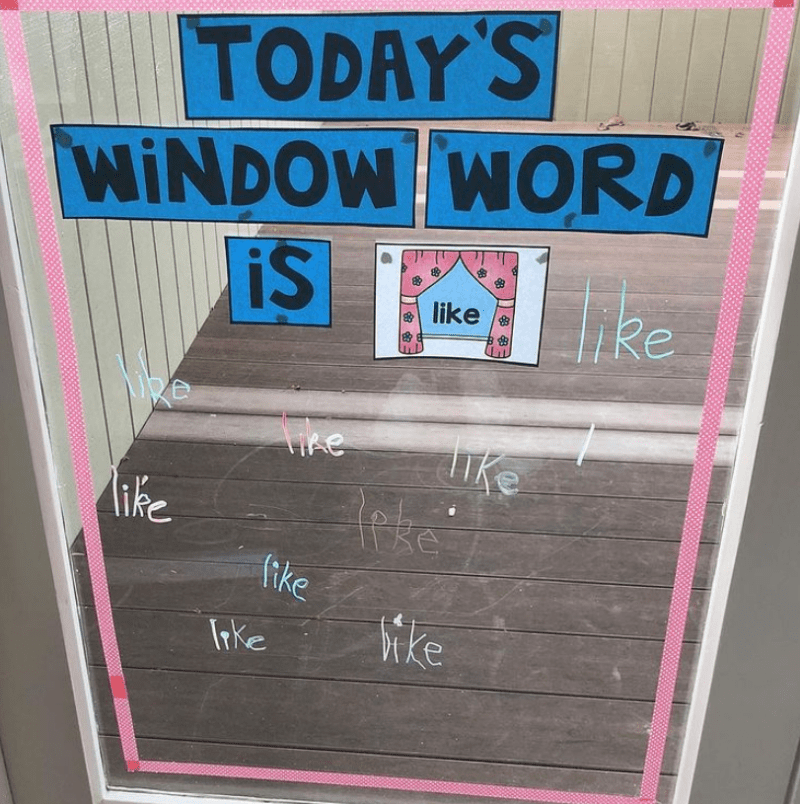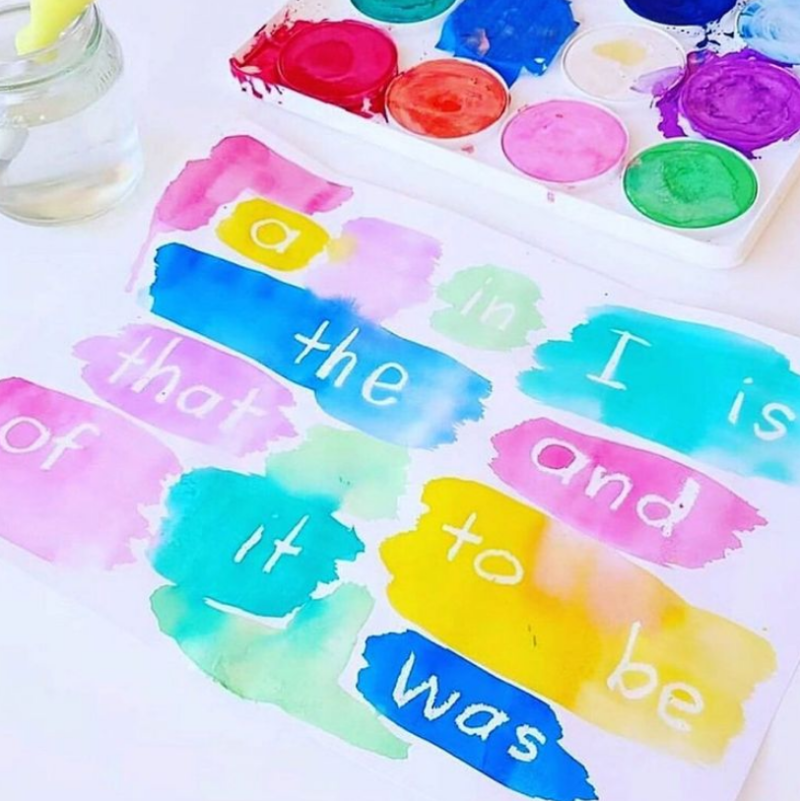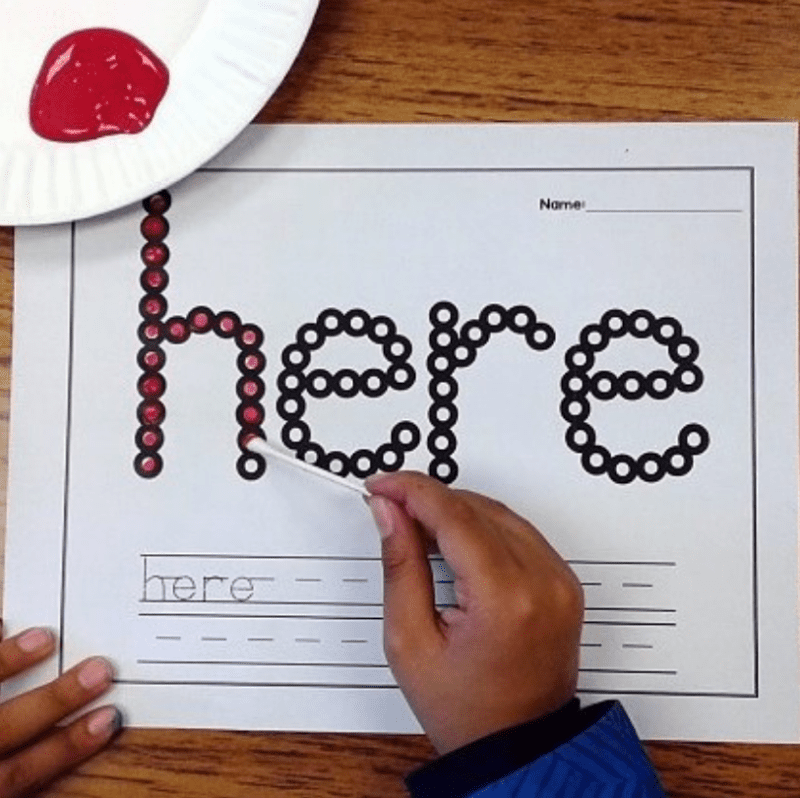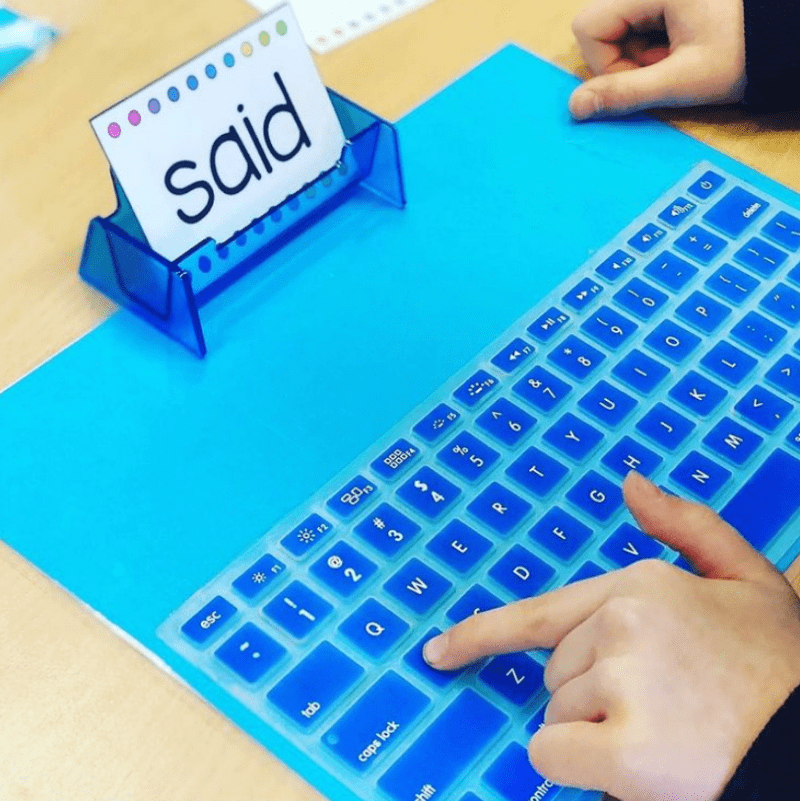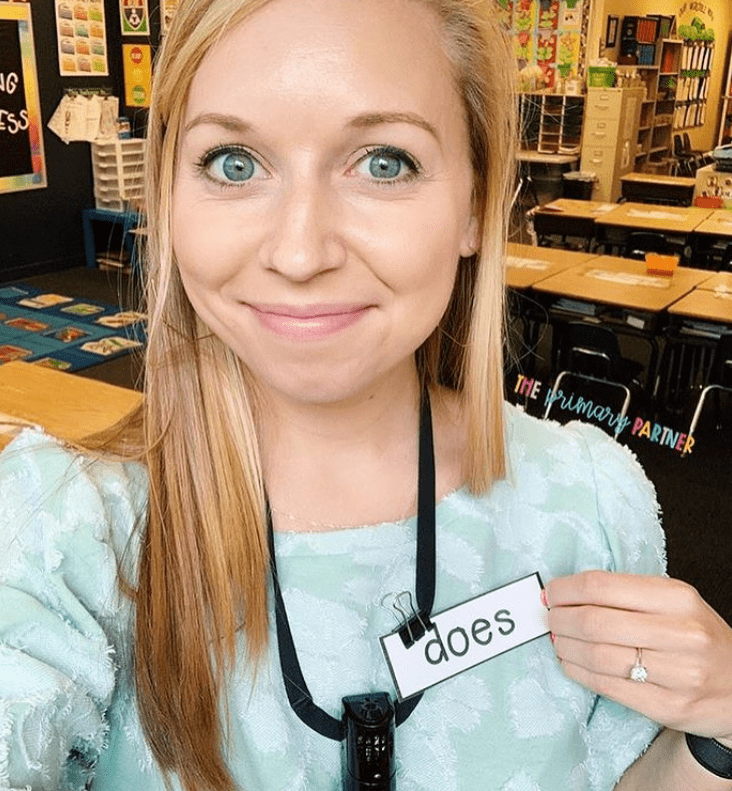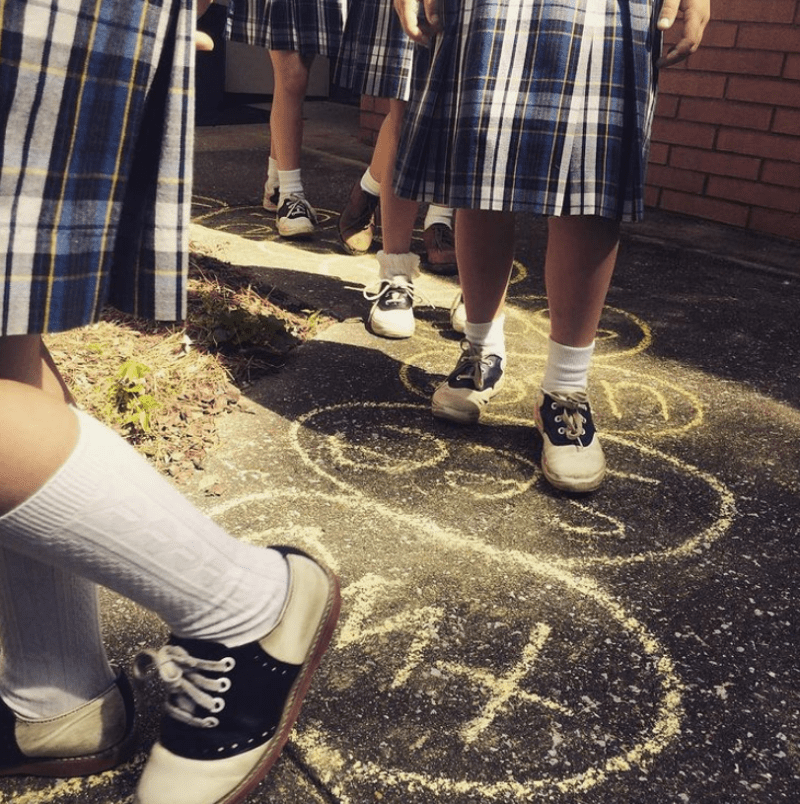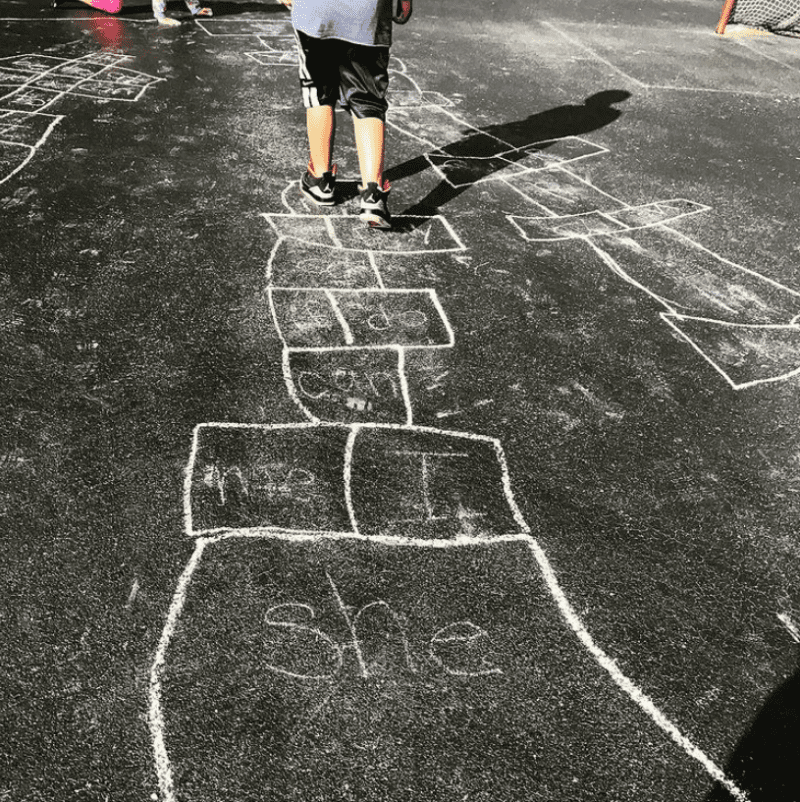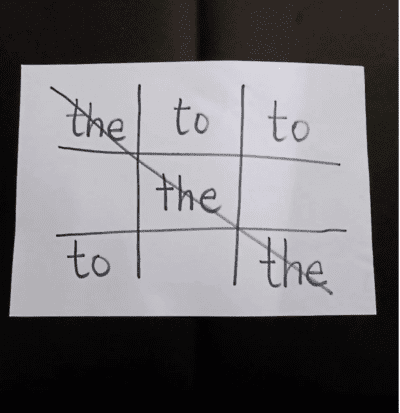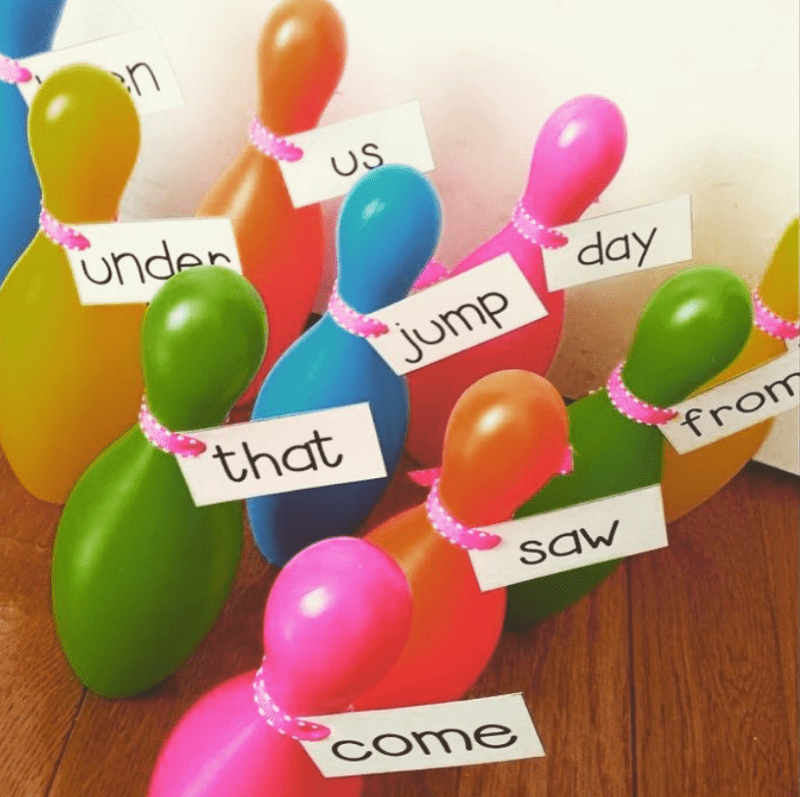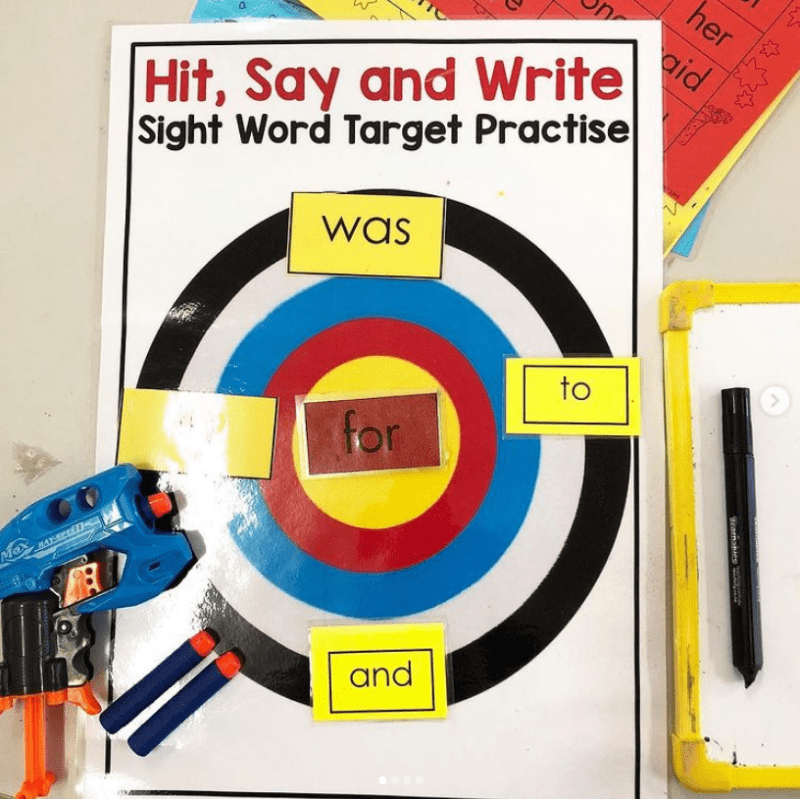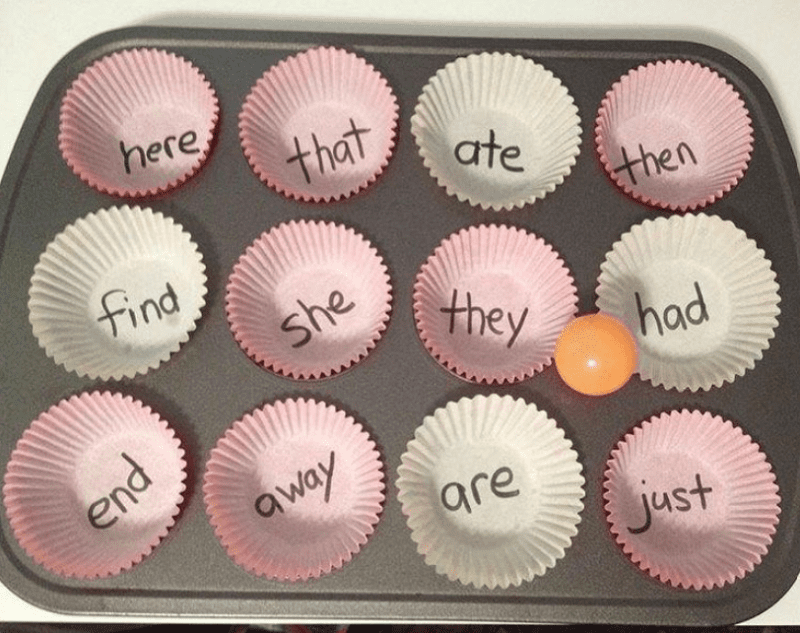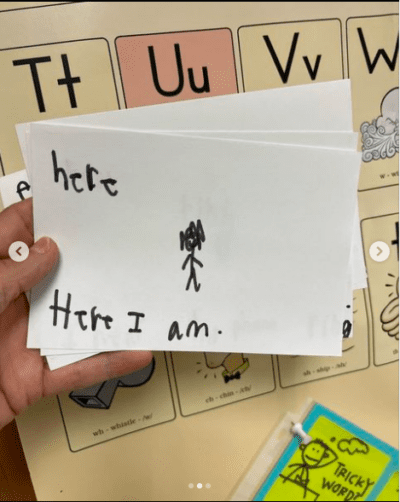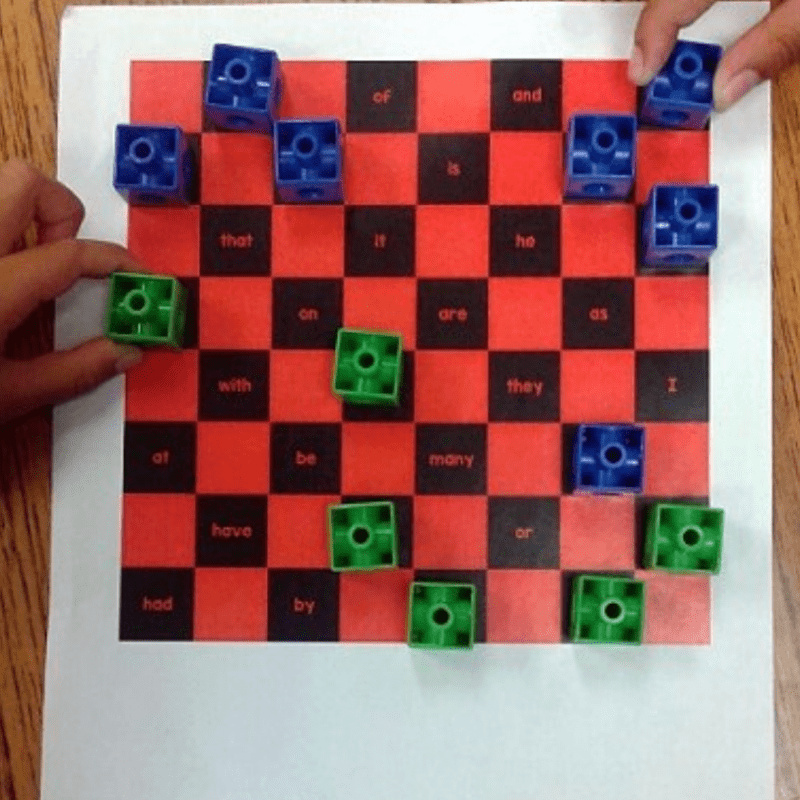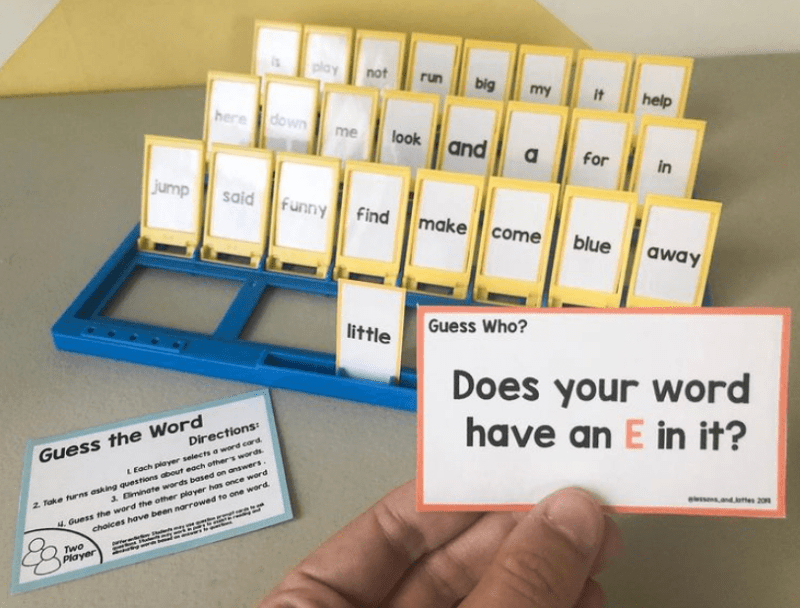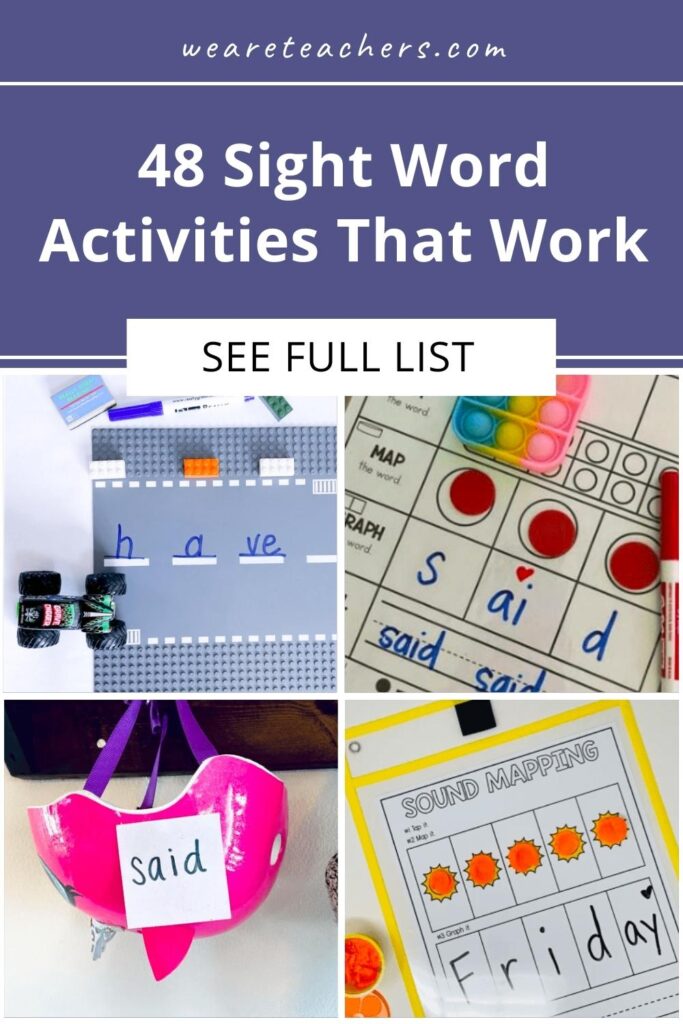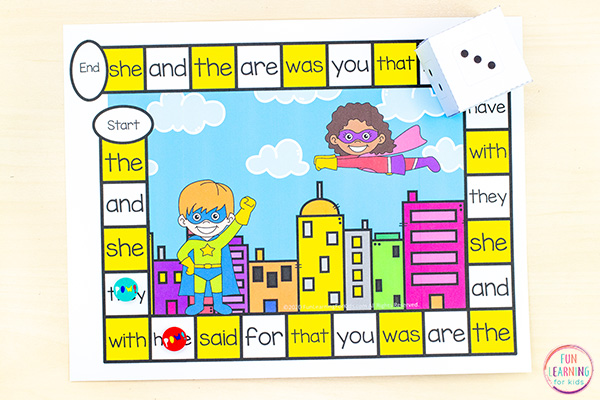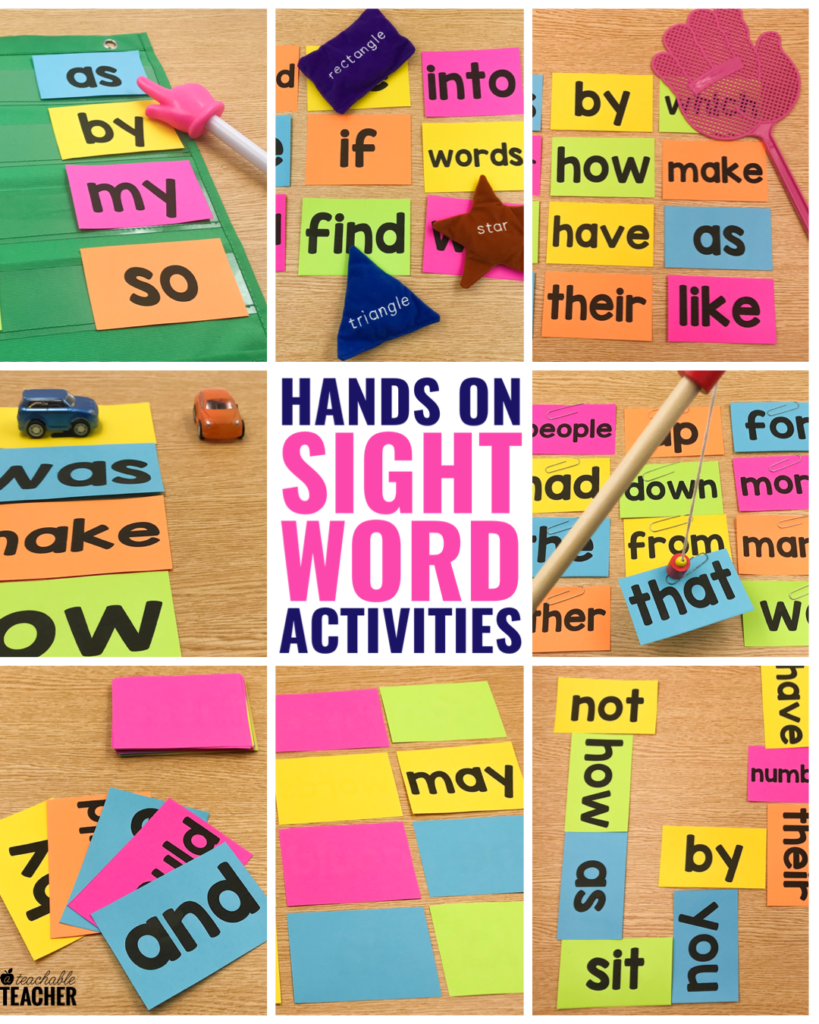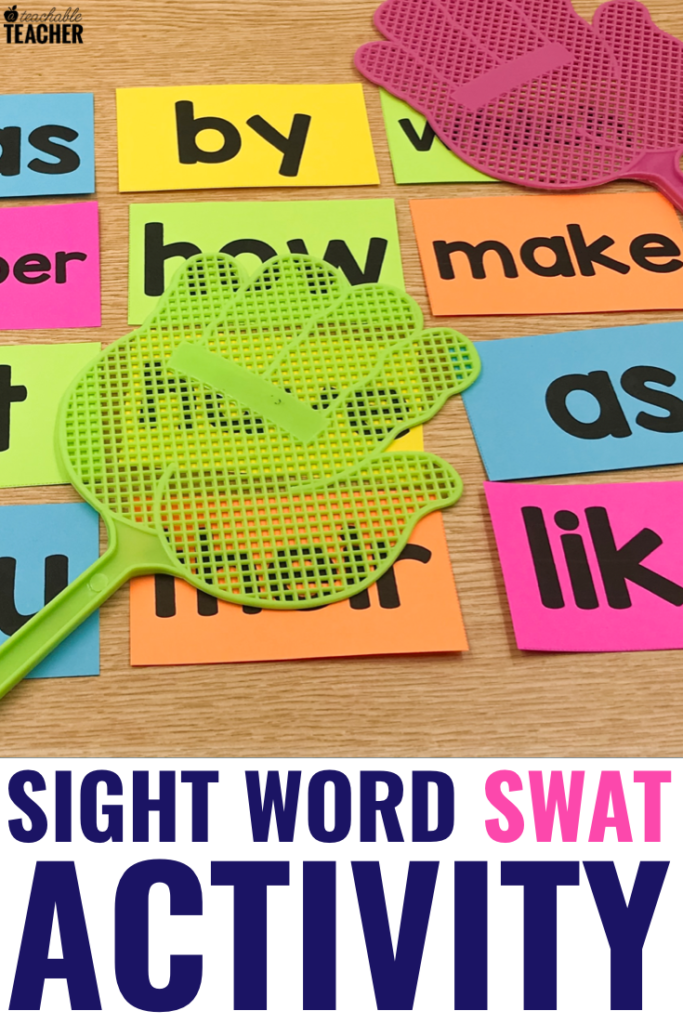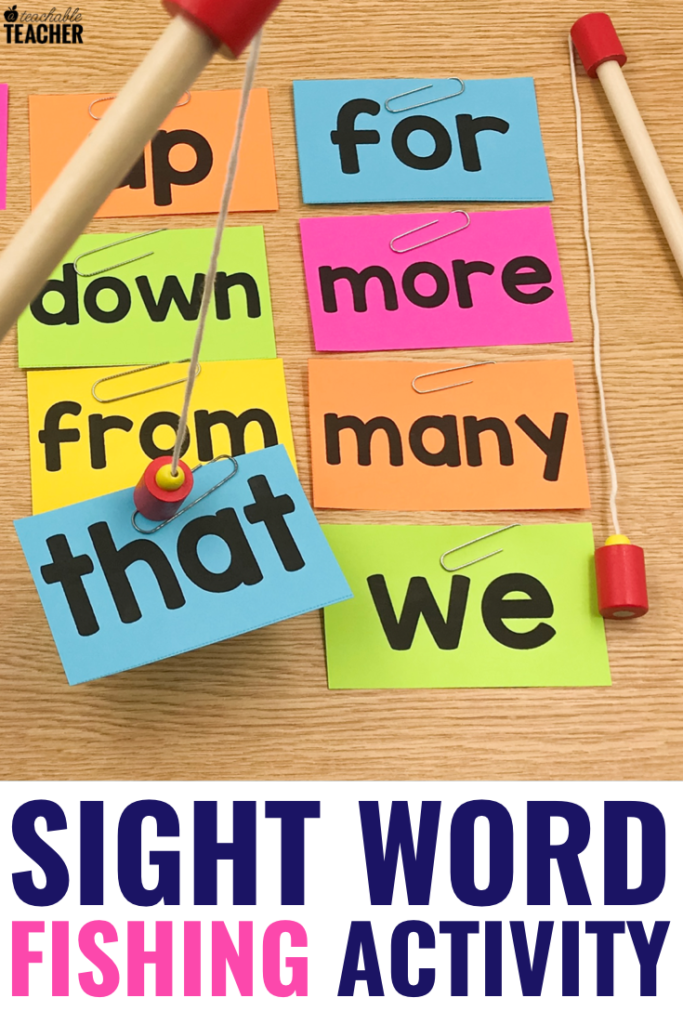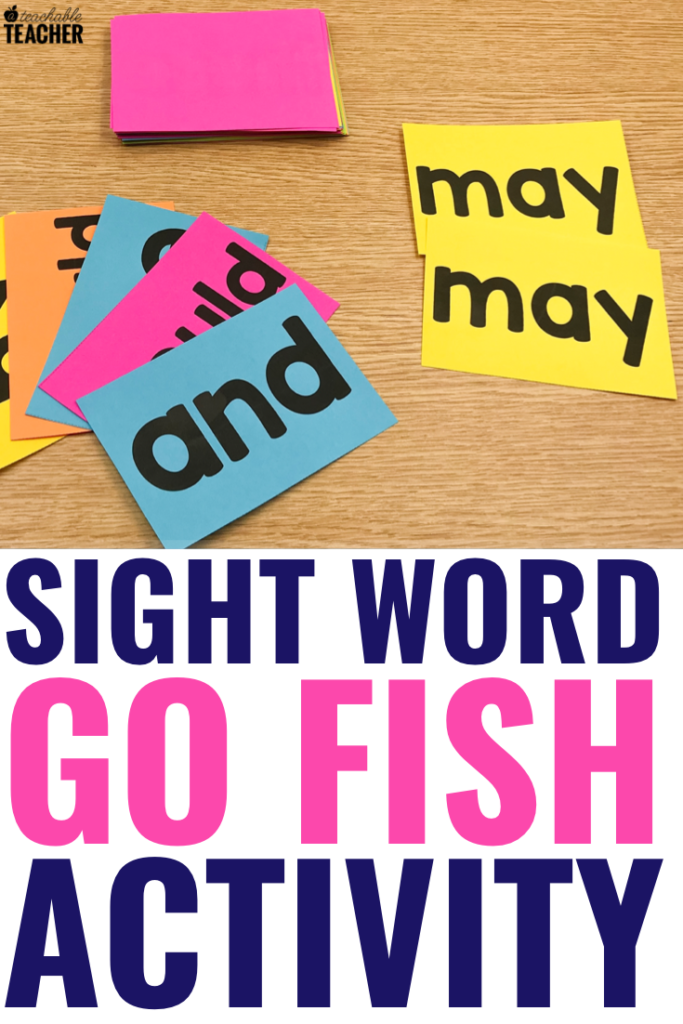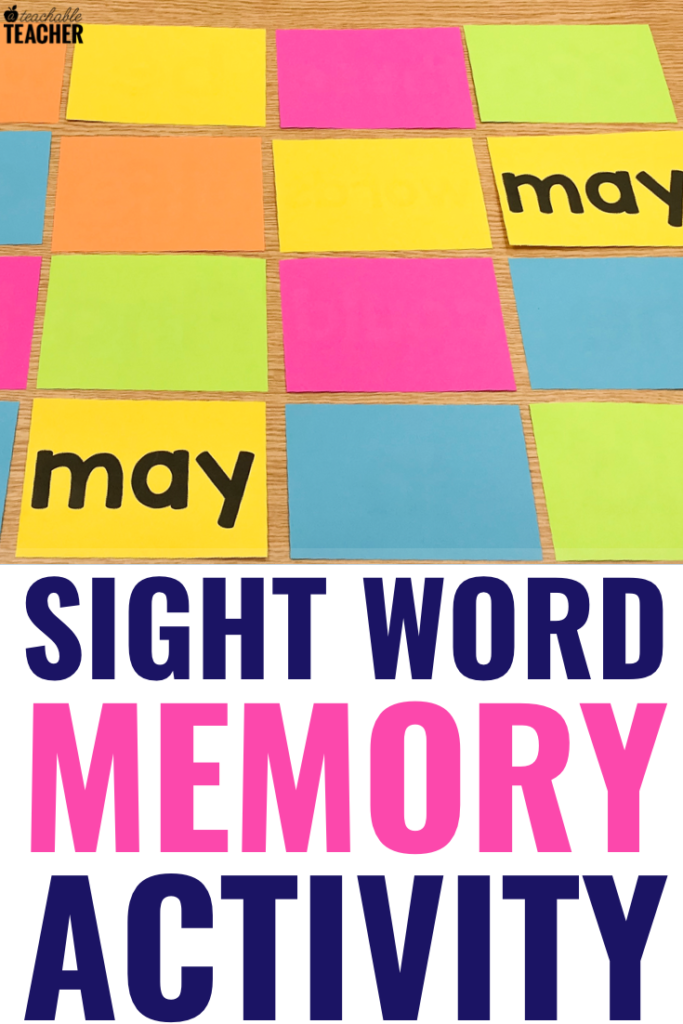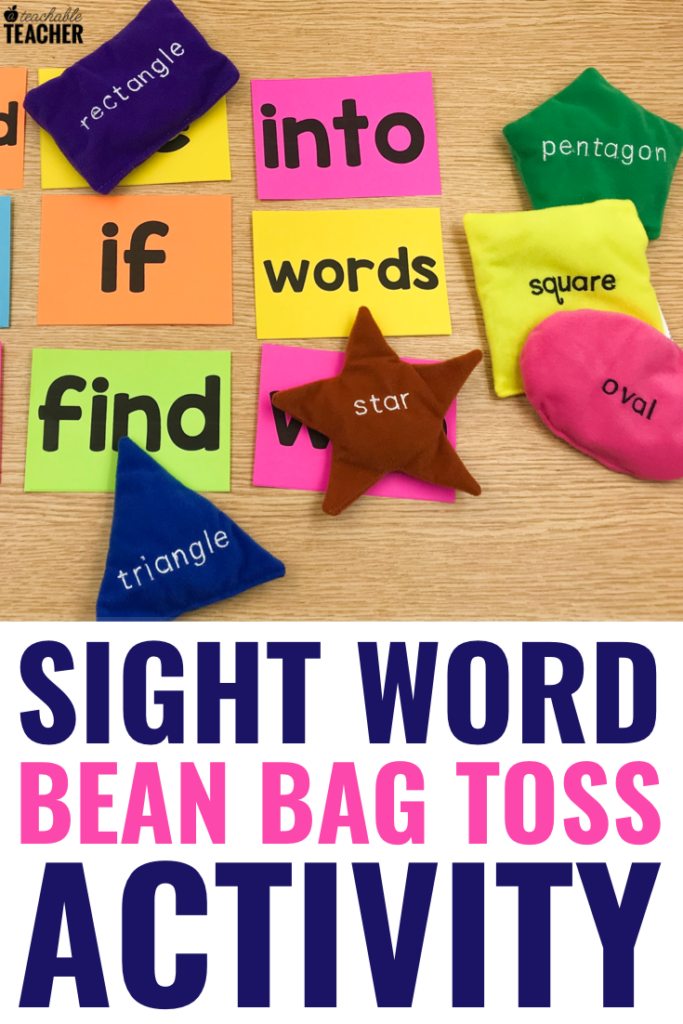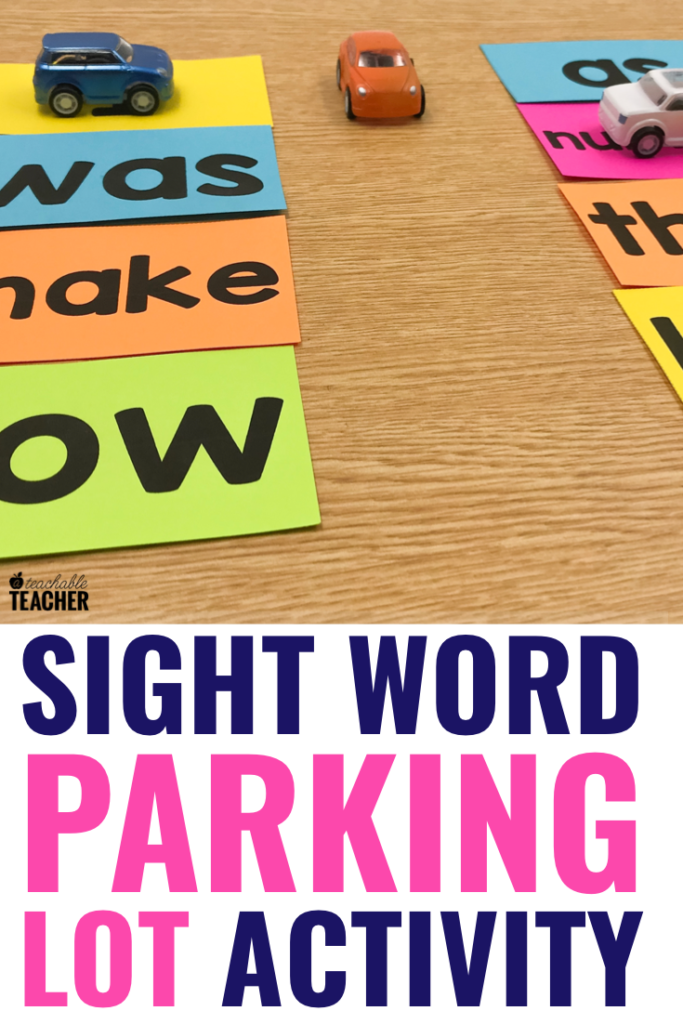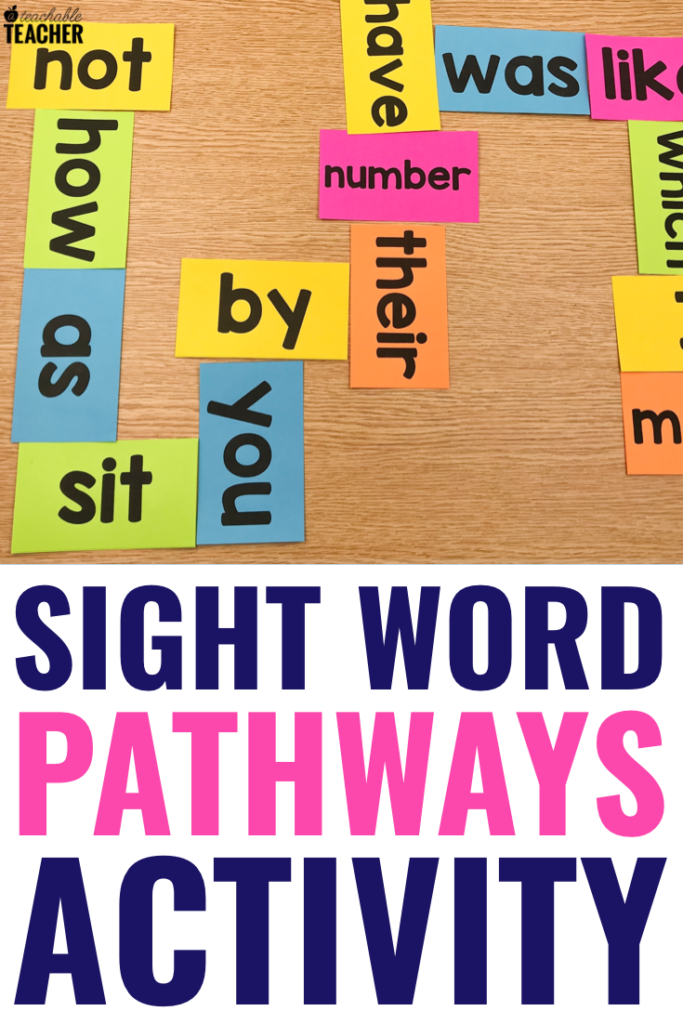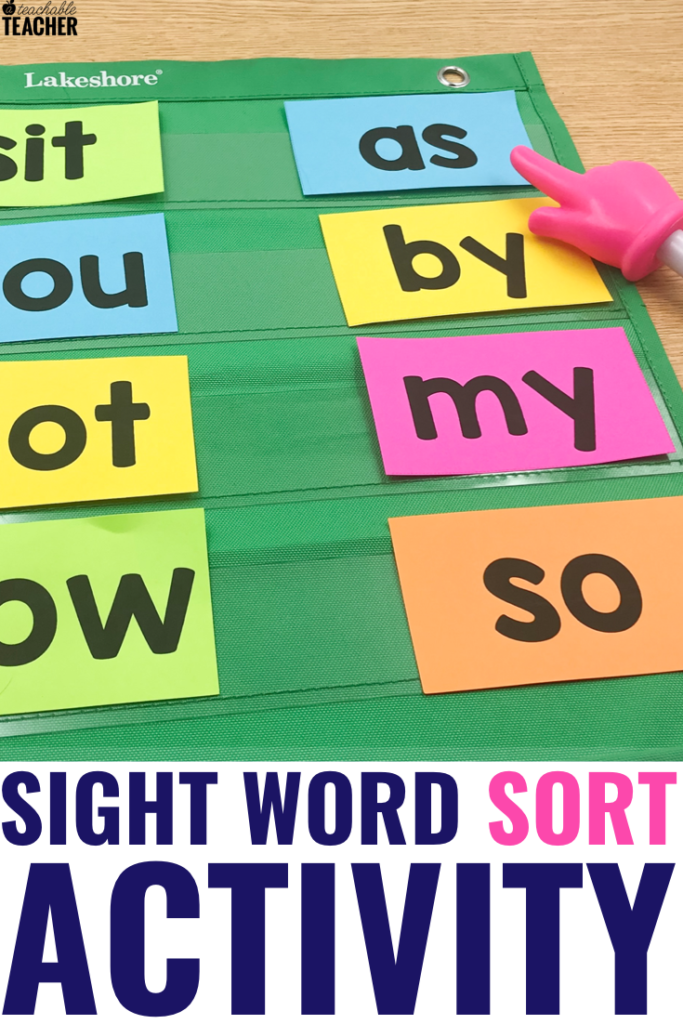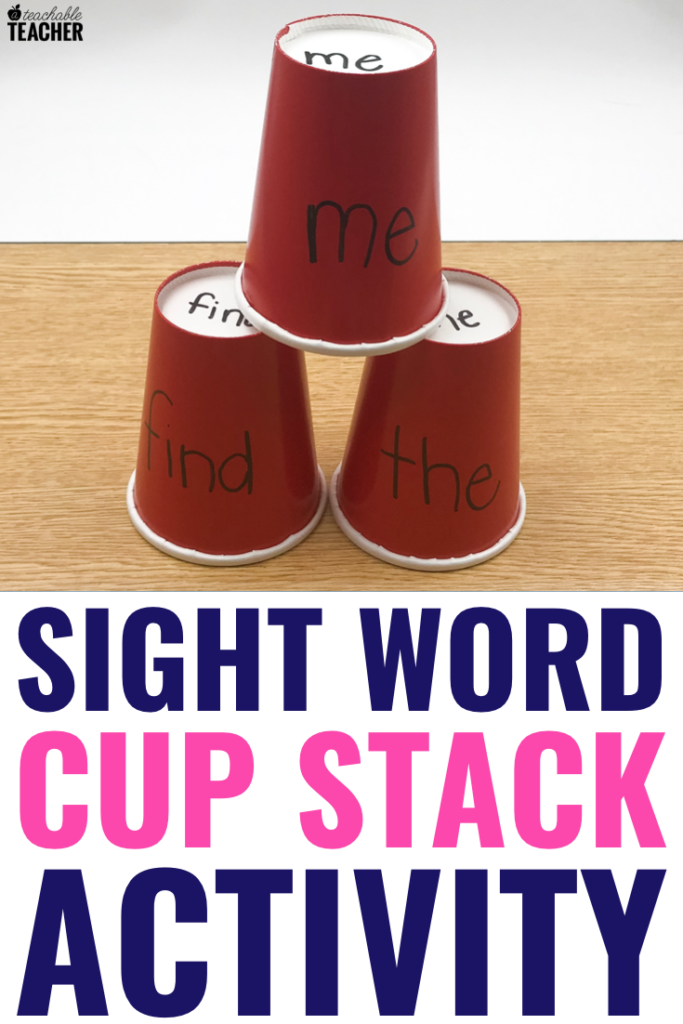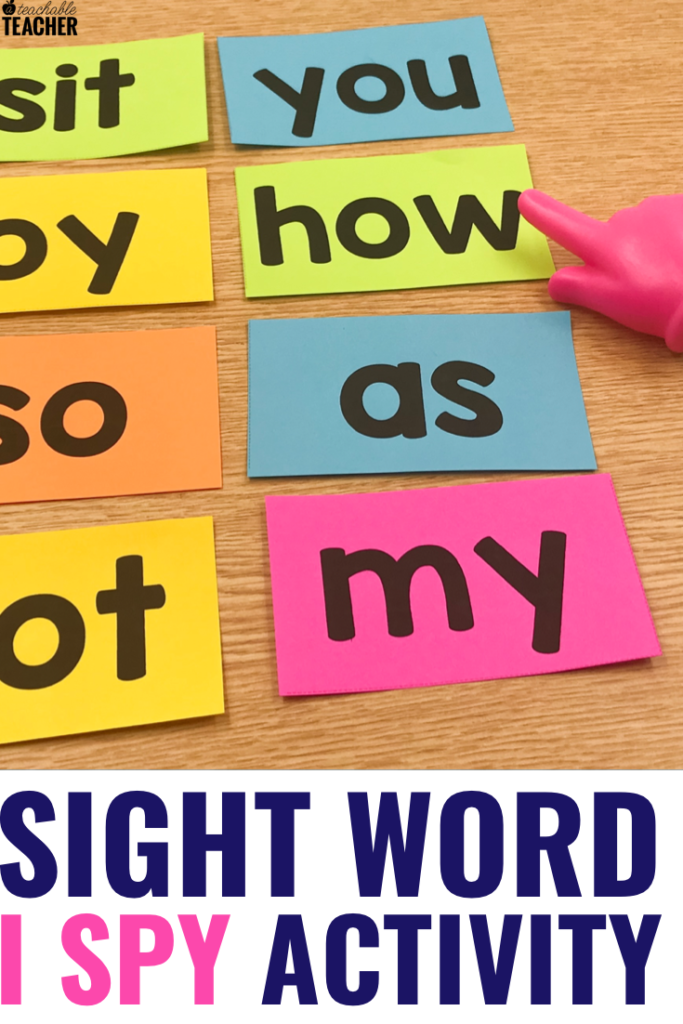Teachers are always on the hunt for great sight word activities. Sight words are any words readers recognize automatically “by sight”—for fluent readers, that’s almost all words! High-frequency words, the most commonly occurring words in written English like those on the Dolch list, are often thought of as the most crucial sight words.
It’s a myth that blindly memorizing every letter in a sight word is the only way to learn it. The science of reading tells us that linking sounds and letters is the most effective way for kids’ brains to learn any word. Many common words are easy to tackle using beginning phonics skills (like “at,” “can,” “him,” etc.), so staying true to a strong phonics curriculum is one way to support kids’ sight word learning. Even irregularly spelled words have decodable parts, e.g., kids can use the sounds of “s” and “d” to help with “said,” even if the “ai” is unexpected. Experts often call these words “heart words” to call out for kids that they should learn the unexpected word parts “by heart.” (If all this is unfamiliar to you, it can feel overwhelming, but you’ve got this! Check out teaching guru Jillian Starr’s explanation for more help.)
Check out these low-prep and engaging sight word activities for both teaching and practicing words.
Sight Word Activities for Introducing Words
1. Map it and drive it
This is a genius way to introduce words with appealing materials: Say the word, represent each sound with a LEGO brick, write letters for each sound, and “drive” to read it.
Source: @droppinknowledgewithheidi
2. Smush play dough for each sound
Set up a routine that works for any word. Play dough squishing for each sound is the ultimate multi-sensory component.
Source: @playdough2plato
3. Map words with a magnet wand
It is so super-satisfying to drag those magnetic dots around! Watch the video below for lots of tips on introducing a word using this process.
Source: @warriorsforliteracy
4. Make a mini book
Lots of handy info in one place for your little learners.
Source: @hughesheartforfirst
5. Tap it, pop it, learn it!
Hardwire those words in kids’ brains with this comprehensive word intro routine. (You had us with the pop its!)
Source: @hellojenjones
Sight Word Activities for Practicing Words
6. Find and swat words
An oldie but such a goodie. Find a word in an array and WHACK! Swat it with a fly swatter!
Source: @kids_play_learn_laugh
7. Flip word pancakes
Serve up sight word pancakes while practicing spelling them aloud.
Source: @bee_happy_teaching
8. Wear heart word bracelets
Make kids feel like sight word VIPs.
Source: @teachingmoore
9. Search for sight word balls
Write sight words on ball pit balls with a chalk marker or dry-erase marker. Kids can race around hunting for balls to read and toss in a basket, or hunt through a big tub of balls for a certain word.
Source: @preschoolforyou
10. Start a sight word band
Loud but oh-so-fun! Feel the rhythm while tapping and reading sight words stuck to homemade percussion instruments.
Source: @earlyyears_withmrsg
11. Drive on a sight word path
This is one of many fun ways to use magnetic tiles for learning! Kids love “knocking down” word tiles with a toy car as they read each one.
Source: @travisntyler
12. Use sticky notes to inspire sight word sentences
Have kids stick words on items that give them ideas for sentences. “My Mom said to wear a helmet!” = so good!
Source: @kinneypodlearning
13. Write words on a sensory bag
So easy: Fill a zip-top bag with a small amount of kid-safe paint, seal well, and have kids practice “writing” sight words with their finger or a cotton swab.
Source: @makeitmultisensory
14. Wear a sight word crown
Wear your word proudly and practice reading others’ words. Fun in person or virtually.
Source: @mrsjonescreationstation
15. Play a magnetic-tile board game
We love new ideas for ways to use magnetic tiles for sight word activities. Easy to set up and fun to play.
Source: @twotolove_bairantwins
16. Spell words to a familiar tune
Get sight words stuck in everyone’s head, in a good way. We’d add a line for chanting the sounds in the word!
Source: @saysbre
17. Feed a word monster
Nom, nom, nom.
Source: @ecplayandlearn
18. Search for the pom-pom under sight word cups
Read all the words as you try to find the cup that hides the prize.
Source: @la.la.learning
19. Play sight word KABOOM
This classroom classic is perfect for sight words. If you need a refresher on the rules, Jillian Starr covers them.
Source: @essentiallykinder
20. Roll and write words
Roll, write, repeat.
Source: @mylittlepandamonium
21. Write words with rainbow colors
Bonus points for aromatic markers.
Source: @mylittlepandamonium
22. Trace words with flashlights
Stock up on batteries because kids never get tired of this!
Source: @giggleswithgerg
23. Find words in plastic eggs
Give kids a checklist of words to find as they open each egg.
Source: @blooming_tots1
24. Spy words around the classroom
Just add a magnifying glass and clipboard to make kids feel like supersleuths!
Source: @readingcorneronline
25. Find words in the morning message
Don’t forget about old standbys! This is one of our favorite ways to get kids to recognize sight words in connected text.
Source: @tales_of_a_kinder_classroom
26. Build words with bricks
Such a great use of extra building bricks!
Source: @raysinkinder
27. Write words in sand
Easy-peasy to set up and keep neat if you use plastic pencil boxes.
Source: @teacherhacks
28. Spell words on a construction site
Bulldozing over each word to read it is the best part!
Source: @planningplaytime
29. Spell words with toy cars
Drive on over!
Source: @lozlovesprep
30. Park in a sight word “parking lot”
This one is easy to modify based on whatever toys are available in the classroom or at home.
Source: @msbendersclassroom
31. “Plant” words in play dough
Watch those reading skills grow!
Source: @planningplaytime
32. Build words in a sensory tub
Because spelling is just more fun when your hands are covered in beans!
Source: @coffeeandspitup
33. Write words on a magnetic drawing board
That eraser track makes for a perfect word card holder!
Source: @moffattgirls
34. Or write words on the window!
Everyone wants a turn to write on the window!
Source: @kindergarten_matters
35. Shhh! Discover words written in invisible ink
Write words in white crayon and reveal them with watercolors on top!
Source: @teachstarter
36. Dot-paint words with a cotton swab
Calming and effective.
Source: @sightwordactivities
37. “Type” words on a keyboard
Busy day at the sight word office! Use a keyboard cover or any old keyboard.
Source: @lifebetweensummers
38. Read words before heading through the door
The line leader can double as the word pointer during transitions.
Source: @ms.rowekinder
39. Read the word the teacher’s wearing!
Wait, is there something on my shirt?
Source: @theprimarypartner
40. Take a sight word cakewalk
Choose a winning word when the music stops!
Source: @joyfulinkinder
41. Play sight word hopscotch
If you can’t get outdoors, tape on the floor works just as well.
Source: @wheretheliteracygrows
42. Play tic-tac-toe
I’ll be team “the.”
Source: @create_n_teach
43. Go sight word bowling
No bowling pins? Use half-filled plastic water bottles instead.
Source: @thecreativeteacher_
44. Ready, aim, read
Just throw a beanbag at a word target if foam darts are a no-go.
Source: @laurens_lil_learners
45. Play muffin tin ball toss
Toss and read. It’s easy to use colored muffin cups to prep different sets of words.
Source: @homeschooling_fun_with_lynda
46. DIY sentence flash cards
Authentic use of words in context for the win.
Source: @teachertipsandtales
47. Play sight word checkers
King me! If kids don’t have a partner available, they can “play” with a stuffed animal and get double practice.
Source: @sightwordactivities
48. Play sight word Guess Who?
Set up this game once and use it forever.
Source: @lessons_and_lattes
We’d love to hear—what are your favorite sight word activities? Share in the comments below.
Want more articles like this? Be sure to sign up for our newsletters.
Plus, what are sight words?
Immy is well and truly on the road to learning to read, arriving home from school with her very first levelled reader last week!
As I have shared previously, learning to automatically recognise high frequency sight words is an important part of learning to read as automatic recall positively influences reading fluency, which in turn aids clearer comprehension – you can read more about the importance of sight words to reading in this post – What Are Sight Words?
Providing lots of opportunity for children to revisit sight words is important to the development of automatic recall but this repetition doesn’t have to be boring, in fact the 50 sight word activity ideas included in the list below are most definitely not boring!
But before we get to the list, if your child loves playing games or learns best through fun and engaging activities (and don’t we all), please take a moment to check out our printable, no prep sight word games pack. Great for home revision, classroom literacy groups or withing learning support settings.
Christie Burnett is a teacher, presenter, writer and the mother of two. She created Childhood 101 as a place for teachers and parents to access engaging, high quality learning ideas.
Let’s talk about what high frequency words are, and how to have fun learning them. Whether you are looking for activities to do at home or in the classroom, these games for high frequency words will help your reader build fluency, reinforce high frequency words, and engage them with hands-on reading strategies.
What are High-Frequency Words
High frequency words, also referred to as sight words, are the most common words in the English language . According to Reading A-Z, 50 percent of all text is composed of high frequency words.
Why are Sight Words Important
Sometimes known as sight words, high frequency words are important to learn to become a fluent reader. A reader’s fluency is composed of their speed, accuracy, and expression.
If the kids become stuck on sounding out word by word, they will lose comprehension. Therefore, by learning to read these most commonly used words in text (high frequency words) by memorization, emergent readers will instantly recognize these words and increase their speed and accuracy.
Activities to Practice High Frequency Words
As a former kindergarten teacher, parents often ask me “How do I teach my 5 year old sight words?”, and “How can I make learning sight words fun?” The truth is there are many ways to make learning to read fun.
These sight word activities will engage kids in a multi-sensory approach to learning how to read. Both parents and teachers will see that fun sight word games are at their fingertips with many of these household items.
1. Sight Word Superstars
Your kids will become “Sight Word Superstars” with these printable activities. Each sheet has the kids practicing their high frequency words 6 different ways!
First, you get to choose which set if best for your kids. Then, they will trace, write, find and circle, tap and read, use in a sentence, and build the word!
Get the Sight Word Superstars HERE or on TPT
2. Popsicle Stick Sight Word Game
Write the sight words on Popsicle sticks. Write “DYNAMITE” on a couple sticks. Put them in a jar. Pull them out
one-by-one, read the word. If you pull dynamite, you have to put them all back in the jar.
I used this game often as a reading tutor for kindergarten, first, and second grade. We would play in a small group, but this is also great as a time filler for the whole class.
3. Write the Words in Salt
Writing the words in sand is a great sensory-based strategy to practice high frequency words. Pour some salt into a small cookie sheet, and let the kids use their finger to write the word.
4. Magnetic Letter Sight Words
Spelling sight words with magnetic letters is a simple hands-on approach to reading.
You can build high frequency words on a file cabinet, refrigerator, on a magnetic dry-erase board, or without a magnetic surface. Simply lay the magnetic letters out on a table to spell the sight words.
The kids can pull from a collection of sight word cards, and build the word using the magnetic letters, and write the word. This awesome magnetic letter kit, posted in my classroom must-haves, comes with foam magnetic letters already sorted and labeled. a magnetic dry-erase board, letter cards, dry-erase markers, and fun holiday magnets.
5. Sight Word Hunt with Nursery Rhymes
Did you know children who are frequently exposed to nursery rhymes early on, are much more likely to develop strong reading skills? It’s true! This is why I use nursery rhymes to teach kids how to read. You can read more on my post about popular nursery rhyme songs for kids.
After introducing a new printable nursery rhyme, let the kids hunt through and highlight the sight words you are focusing on.
6. Sight Word Tic-Tac-Toe
Add a twist to a classic game. Let the kids pull a sight word card. Then, they read it, use it in a sentence or spell it before adding an X or O to the board.
7. Sight Word War
Playing with a partner, use 2 stacks of sight word cards, each player flips over a card. Whoever reads the sight word first keeps the cards. If they flip the same word card, it’s War! Then, they lay 2 facing down, and the third one flipped up. Whoever reads that third one fastest, wins that pile. In the end, the kid with the most card, wins.
8. Use Wikki Stix
The kids love using Wikki Stix to make words, numbers, and shapes. Why not let them use Wikki Stix to make the sight words?
9. Shaving Cream Sight Words
Write the high frequency words in a dab of shaving cream on the table. Shaving cream writing is excellent for sensory based interventions.
Using shaving cream for spelling words and writing sight words are just a few of the shaving cream activities for kids who are kinesthetic learners. You can also make shaving cream playdough and have the kids make the words with that.
10. LEGO Sight Word Game
Use dry erase markers to write sight words on the side of legos, and place them in a pile. Call out a word, have your child find the lego with that word, and add to the tower. There are endless sight word lego activities for kids.
If your child is doing well at recognizing the sight words, but has difficulty spelling them, you can write individual letters on the legos and have them build the word.
You will want to use the large Mega Blocks if writing the whole word, such as the ones used for my pictures. The standard lego size is too small. Did you know LEGOS are on my list for the 10 Best Learning Toys for Kids?
11. Flashlight Tag With Sight Words
Hang sight words around the house, or in the classroom. Then, turn off the lights, call out a sight word, and have your little learner find it with a flashlight.
12. Sight Word Tallies
Write 5 sight words on a piece of paper. Search through books and magazines, and put tally marks next to the words as you find the words.
13. PlayDoh Sight Words
Use playdoh to form the letters and build the sight words. In the video below, you will see how my first grade students used playdough to make high frequency words. After they form the word, they trace it with their finger, then use the word in a sentence. As a follow up, have your kiddos write the sight word, or write a sentence using the sight word.
14. Play I Have, Who Has
I Have Who Has is a fun way to practice any skill. In this case, the kids can practice reading sight words with family members, in a small group, or in a whole class setting.
The kids read the high-frequency word on their card, then ask who has the word printed on the bottom half of their card. The video below is a demonstration of I Have, Who Has being played in a small group.
You can choose from the following printable I Have, Who Has games below:
- Pre-Primer Sight Words I Have, Who Has
- Primer Sight Words I Have, Who Has
- First Grade Sight Words I Have, Who Has
15. Use Traditional Flashcards
You can also print a set of sight word flashcards, or write the words on index cards, and review 5-10 a night.
Free Sight Word Printable
Teaching kids how to read requires patience and daily practice. Parents often want to help at home, but aren’t sure what to do. You can get this free letter as a reminder of how to help kids with sight words at home.
Grab your FREE Parent Letter for Sight Words, HERE.
High Frequency Word List
If you look over an elementary school’s curriculum, you may find they have a list of words per grade level, along with reading materials, word rings, class books, and more for the young children to use.
Typically, there are two major lists of common sight words young readers will learn from. They are the dolch words and fry words.
Dolch Words
Pre-Primer: the, to, and, a, I, you, it, in, said, for, up, look, is, go, we, little, down, can, see, not, one, my, me, big, come, blue, red, where, jump, away, here, help, make, yellow, two, play, run, find, three, funny
Primer: he, was, that, she, on, they, but, at, with, all, there, out, be, have, am, do, did, what, so, get, like, this, will, yes, went, are, now, no, came, ride, into, good, want, too, pretty, four, saw, well, ran, brown, eat, who, new, must, black, white, soon, our, ate, say, under, please
First Grade Words: of, his, had, him, her, some, as, then, could, when, were, them, ask, an, over, just, from, any, how, know, put, take, every, old, by, after, think, let, going, walk, again, may, stop, fly, round give, once, open, has, live, thank
Second Grade Words: would, very, your, its, around, don’t right, green, their, call, sleep, five, wash, or, before, been, off, cold, tell, work, first, does, goes, write, always, made, gave, us, buy, those, use, fast, pull, both, sit, which, read, why, found, because, best, upon, these, sing, wish, many
Fry List of Words:
Fry words, unlike the Dolch list, are not broken down into grade level. The kids, however, are introduced to new words after mastering each group of 100. This does not mean young children are expected to learn 100 instant words at once. Most often, the teachers break down the expected amount of words to learn in groups of 5-10 at a time, week after week.
Fry’s First 100 Words: the, of, and, a, to, in, is, you, that, it, he, was, for, on, are, as, with, his, they, I , at, be, this, have, from, or, one, had, by, words, but, not, what, all, were, we, when, your, can, said, there, use, an, each, which, she, do, how, their, if, will, up, other, about, out, many, then, them, these, so, some, her, would, make, like, him, into, time, has, look, two, more, write, go, see, number, no, way, could, people, my, than, first, water, been, called, who, am, its, now, find, long, down, day, did, get, come, made, may, part.
You can search for the remaining words,- they are known as the second and third lists. The Fry and dolch sight words increase in difficulty as the kids get older.
Before you go, here are some blog posts you may enjoy:
20 Basics of a Kindergarten Classroom
122 Best Knock Knock Jokes Kids Love
34 Best Nursery Rhymes for Kids
15 Amazing Benefits of Math Talks with Kids
25 Printable Kindergarten Vocabulary Worksheets
High Frequency Words
These free sight word activities and sight word games require very little prep and are super easy to differentiate for any level. Better yet, the kids will beg to play them!
Most are editable so you can use them for any high frequency words or heart words you are teaching.
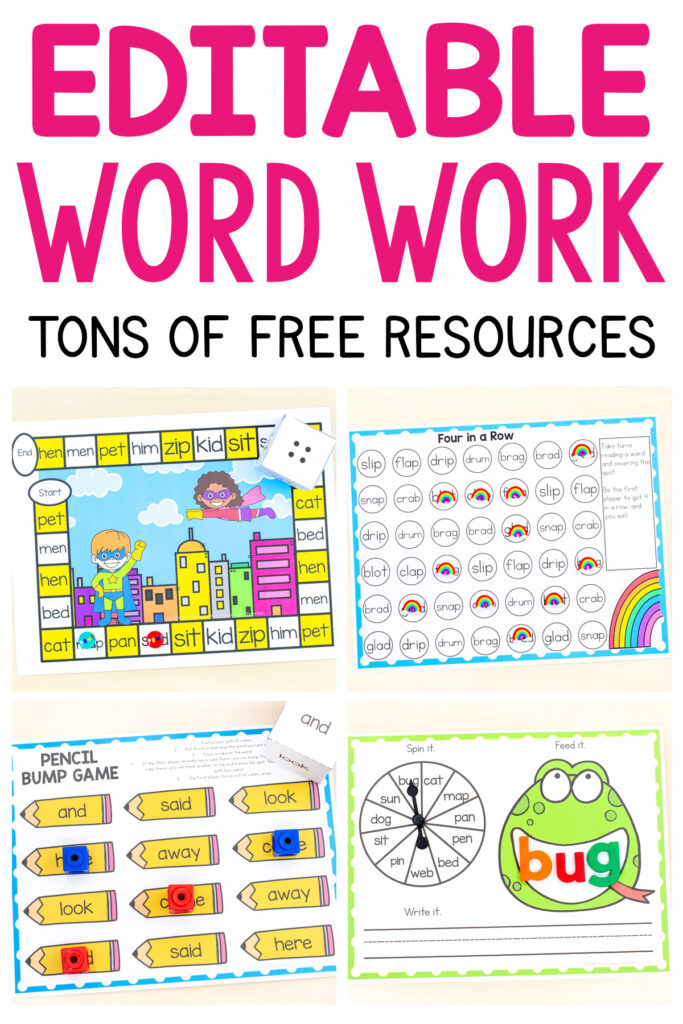
These high frequency word resources are going to make differentiation super easy for you!
Fun Sight Word Games
These word work activities are perfect for kids who are learning to read and need fun, hands-on ways to learn to read and spell words.
Forget the flash cards and the quizzing and give these digital and printable activities a try. You won’t regret it.
My kids beg to play these sight word games and activities and we are able to use them to work on a large variety of skills.
Most of the games are editable which means you can also type in CVC words, blend words, word with digraphs or vowel teams, and lots of different phonics skills.
Differentiated Word Work
Because most of them are editable, you can easily change out the words whenever you need to.
Changing the words on the games can be done in a matter of a minute or two. It couldn’t be any easier!
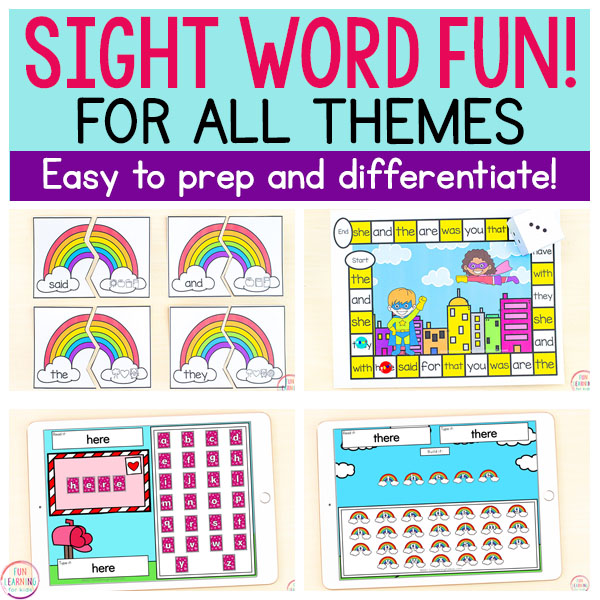
High Frequency Words Activities for All Themes
These sight word activities and games come in a large variety of themes, so you can find activities for any season and many of the different themes you use in your classroom.
There are resources for fall, winter, spring and even summer as well as activities for most of the major holidays.
Plus, there are sight word activities for lots of fun themes like unicorns, robots, dinosaurs, and more!
Check out the list of sight word resources below!
Get the Editable Sight Word Games Bundle Today
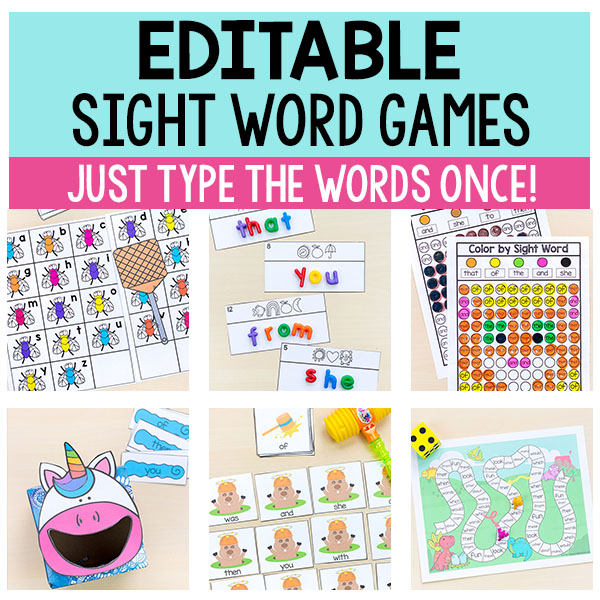
Want to make learning sight words even more fun? Then you will LOVE our editable sight word games bundle! It is our best-seller and teachers have given it rave reviews.
Memorizing sight words and high frequency words is such an important part of learning to read. These sight word activities will keep your students actively engaged while getting tons of practice with the words YOU choose.
As teachers, we know students are more likely to learn something if they connect with and enjoy it. I find that many of my students learn through touch and movement. Because of this, I love using activities that allow them to be active, to touch, to move, and to have fun!
The best part about these sight word activities is that students love them.
I use many of them during guided reading and literacy centers so engagement is essential. When my kids think they’re playing instead of learning, we are all having a better time.
Sight Words and High frequency Words
Sight words and high frequency words aren’t just read and memorized on the spot. (Wouldn’t that be amazing 🤪)
There are well over a hundred that are so common they show up in the text we read all the time. They appear even more often in new reader’s text. These words are super important but they are also super tricky for some of our new readers.
Note: Did you know there is a difference between sight words and high frequency words? I thought they were the same thing for the longest time. Learning the difference changed how I taught them. You can read more about that here!
This post contains affiliate links. By purchasing through this link, we get a small commission. Rest assured – we only share links to products that we know and love!
These sight word activities are hands-on, simple, fun and require very little preparation on the teacher’s part. 🙌
Each one can be done with a set of sight word flashcards and not a single one needs a worksheet to be copied. 👏 👏 👏
Free Sight Word Flashcards
Do you need flashcards? Don’t worry, I’ve got you covered! You can download my editable sight word flashcards right here!
Setting Up the Sight Word Flashcard Activities
I keep the activities in a container like a box or basket. Students are shown how to get the materials out, set them up, use them and clean them up.
Giving my student’s these responsibilities teaches them to be independent and saves me time setting up, giving directions multiple times and cleaning up. 🥳
In my classroom, students are grouped into pairs for literacy centers. These activities can easily be scaled up for more or down for one. I just find partners work best for me. I will refer to my partners as P1 – Partner 1 and P2 – Partner 2.
The way your students use these materials and do these activities is totally up to you. I’m sharing how I have done them in my own classroom but that is definitely not the only way!
Have fun with them. I can assure you that your students will!
Sight Word Fly Swat
Materials: Two sets of sight words cards and a fly swatter.
Set Up: Lay one set of cards out in a grid, face up. Put the second set of cards face down in a stack as a draw pile.
Activity: P1 pics up a card from the draw pile and reads the card. P2 finds the word and swats it with the fly swatter.
Partners can switch back and forth or each go through the whole stack. A variation is having P1 read the letters in the word for P2 to find.
Sight Word Fishing
Materials: Sight word cards with a paper clip attached and fishing poles with magnets.
Set Up: Lay cards out or keep them in a tub (or a pool if you’re feeling fancy!).
Activity: P1 and P2 go fishing for sight words. They can either take turns or go at the same time. Each time they “catch” one, they show it to their partner and read it aloud. ?
Later on in the year I have my students come up with a sentence for the word they “caught” to extend the activity. ?
Note: you can make your own fishing poles with a dowel rod, string and a magnet. Simply tape or glue the string to the end of the rod and hot glue a magnet to the end of the string. This works like a charm if you don’t have fishing poles and can’t purchase them.
Sight Word Go Fish
Materials: Two sets of sight word cards. I recommend using about 20 words for this game.
Set Up: Shuffle or mix up the cards and put them in one stack as a draw pile. Each partner gets 5 cards.
Activity: Play “Go Fish” with cards. P1 looks at their cards and chooses one. P1 asks P2 if they have the match to that card. If P2 has it, they pass it over. If they do not, P1 gets to draw a card from the draw pile.
When a player has a match, they say what it is and lay it down. When all the matches have been found, they count how many they got and play again.
Sight Word Memory
Materials: Two sets of Sight word cards. I usually use 15-20 words we have been practicing.
Set Up: Mix up all of the cards and lay them face down in a grid.
Activity: P1 and P2 take turns looking for matches. On their turn, they flip over two cards and read them. If they are a match, they keep them. If they are not a match they turn them back over. When all the matches have been found, mix them up and play again.
Sight Word Bean Bag Toss
Materials: Sight word cards and bean bags.
Set Up: Lay the cards face up in a grid.
Activity: Partners take turns tossing bean bags onto cards. We do this in a couple of ways depending on the time of year.
At the beginning, we toss the bag, spell the word and say it.
Later in the year, P1 tells P2 what word to toss it on too. P2 tries to land their beanbag on the correct word.
Finally we play this game by giving directions. P1 might say “Toss the bag onto a word with 4 letters.” Then P2 tosses the beanbag onto a 4 letter word and reads it.
Sight Word Parking Lot
Materials: Sight word cards and cars.
Set Up: Create a parking lot with the sight word flash cards.
Activity: Each partners drives a car up to a flashcard. They read the flashcard as they drive up and park their car. They say “I parked my *description, like red* car on the word ______.” Then they get another car to park.
When all the cars have been parked, partners work together to “clear the parking lot.” They read the words as they drive their cars out of the parking lot.
Sight Word Pathways
Materials: Sight word cards.
Set Up: Partners work together to create a path (in a designated area) with sight word cards.
Activity: Partners take turns walking along the path they created. Each time they step on (or next to) a word, they read it aloud. After they finish going through their path, they can do it again or create a new one!
Note: I tell me students to step on either side of the word card so they can read it. That way they don’t slip on the laminated card and it lasts much longer.
Sight Word Sort
Materials: sight word cards and a pointer. (Optional: pocket chart, cards to make “headers.” )
Set Up: None
Activity: Partners decide how they will sort the cards. (The first idea I give is to sort by number of letters.) They sort the cards by the rule they determined. Then they point to the words with the pointers and read them.
I let my students use a pocket chart for this activity. I also let them use scrap paper to make “headers” for the top of their sorts. They love playing teacher so this activity is a favorite for them.
If they finish making and reading their sort, they can choose another way to sort and do it all again.
Note: I give them some options at the beginning of the year but they often come up with their own as the year goes on!
Sight Word Cups
Materials: Sight word cards and dixie cups or solo cups with matching sight words on them. (I use solo cups and write words on them in sharpie because they generally last the whole year!)
Set Up: Set out cups so you can see all of the sight words and put the sight word cards in a stack as a draw pile.
Activity: Partners take turns drawing sight word cards from the draw pile. P1 draws a word and reads it. Then P1 looks for the cup with that word and uses it to start a tower. P2 draws a card and does the same thing.
They go back and forth, finding cups and using them to build epic cup towers. I guarantee your students will think you are the COOLEST teacher ever when you show them this game. ?
I Spy a Sight Word
Materials: Sight word cards or a word wall
Set Up: Lay the cards out in a grid
Activity: Partners challenge each other by picking secret sight words for the other partner to guess. P1 chooses a word from the word wall and says “I spy, with my little eye, a word that _____.” P2 guesses a word. P1 either says “You got it!” or “That’s not my word.”
This game needs some scaffolding. We play it whole group and in guided reading for a few weeks before I move it to a center. I give all sorts of clues so they can have lots of examples like: number of letters, ending sound, number of syllables, etc.
I also make sure to tell them that they should only say what the first letter or sound is when they are ready for the other person to get it! That is usually a giveaway!
Don’t those all sound like so much fun? I seriously feel like a rockstar teacher when I see my kids laughing, collaborating and having fun while practicing sight words and high frequency words.
If you’re looking for more ways to practice sight words, check out this post with all of my favorite online games to practice sight words!
Do you have any favorite sight word activities I should try in my classroom? Let me know below! 👇

